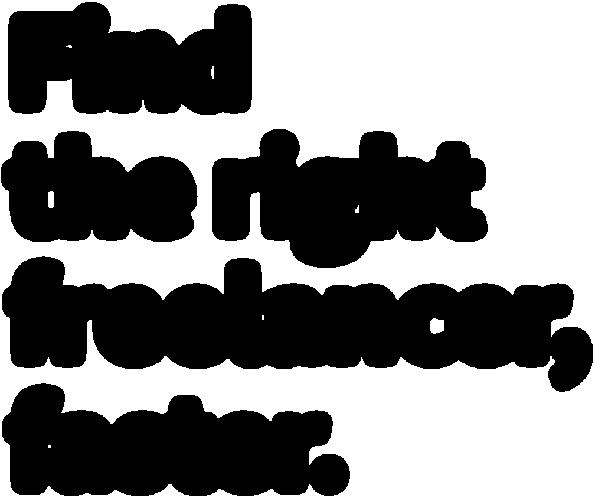


























































Henry Chang, CEO of game developer-publisher Wemade, is betting on a play-and-earn-and-pay era of blockchain gaming.
by ABY SAM THOMASArmed with lessons learnt through a successful career spanning more than 25 years, Maha Abouelenein, a communications-pro-turnedentrepreneur, is now authoring her own book.
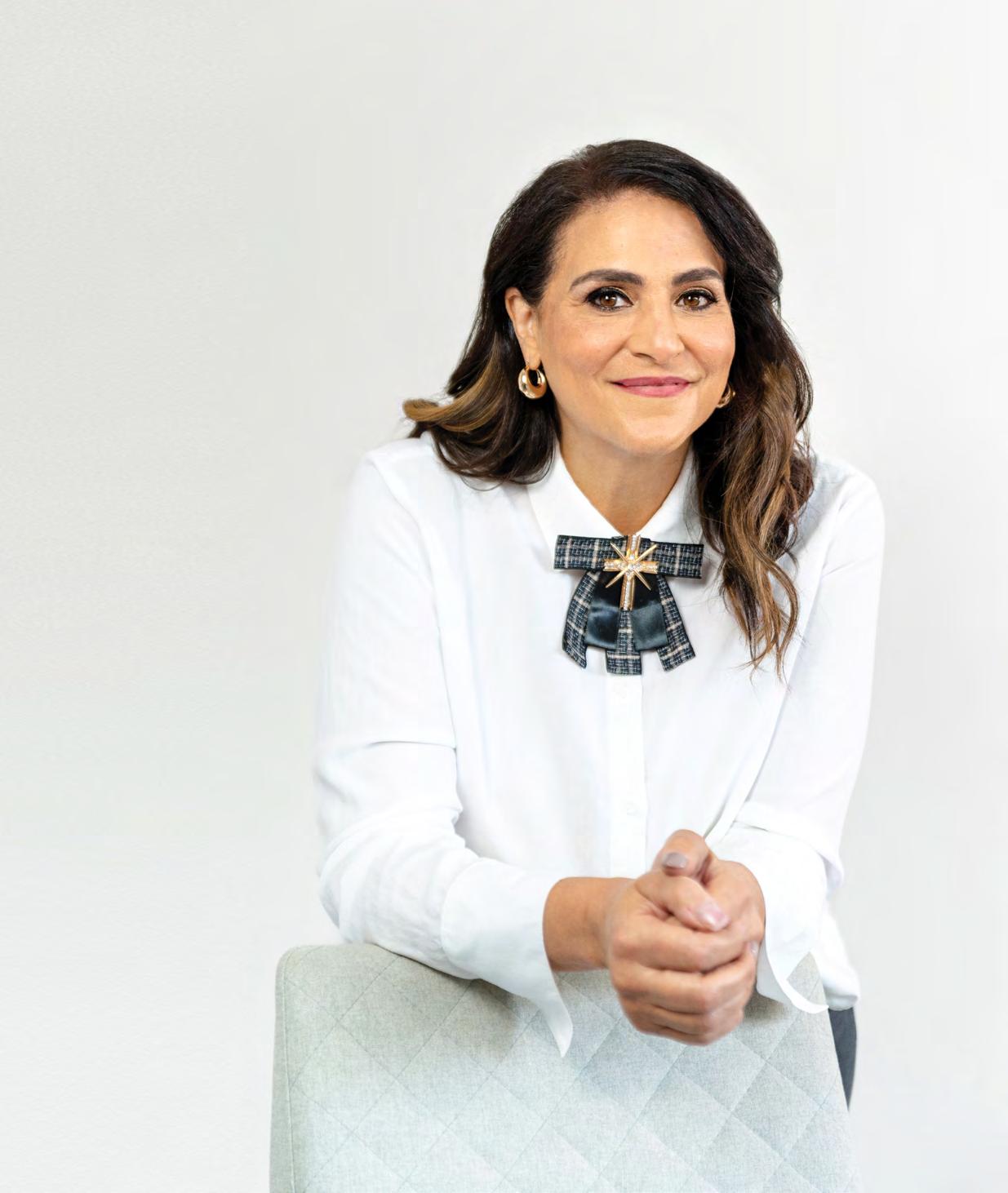 by TAMARA PUPIC
by TAMARA PUPIC
Cairo-based startup Goodspace is using the art of dance to build a tight-knit community and a successful business.
by AALIA MEHREEN AHMED←”My measuring stick for life is based on what I am doing to bring value to others- personally and professionally.”
- Maha Abouelenein.


EDITOR IN CHIEF Aby Sam Thomas aby@bncpublishing.net
CEO Wissam Younane wissam@bncpublishing.net
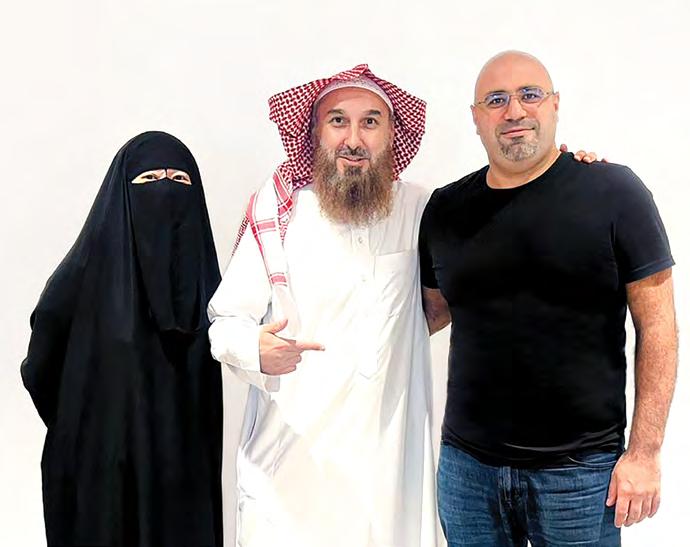
DIRECTOR Rabih Najm rabih@bncpublishing.net
CREATIVE LEAD Odette Kahwagi design@bncpublishing.net
MANAGING EDITOR Tamara Pupic tamara@bncpublishing.net
STARTUPS SECTION EDITOR Pamella de Leon pamella@bncpublishing.net

FEATURES WRITER Aalia Mehreen Ahmed aalia@bncpublishing.net
DIGITAL SOLUTIONS DIRECTOR Mahdi Hashemi mahdi@bncpublishing.net
HEAD OF INNOVATION Sarah Saddouk sarah@bncpublishing.net
GROUP SALES DIRECTOR – B2B GROUP Joaquim D’Costa jo@bncpublishing.net
COLUMNIST Tamara Clarke
CONTRIBUTING
Jumana Abdel-Razzaq, Jad Antoun, Fida Chaaban, Ahmad Mkhallati, Jasmine Navarro, Medea Nocentini, Osman Sultan

instances where the façade being showcased is a far, far cry from the reality on the ground, especially when you get down to the brass tacks of it all.
Now, this is not really an issue that is new to the entrepreneurial landscape- cautionary tales abound about startups that essentially plotted their own downfalls by using falsehoods and fictions to portray themselves as functional businesses when the truth was that they were anything but. And yet, it sometimes feels like our ecosystem continues to be flush with poseurs and pretensions hell-bent on realizing the “fake-it-till-you-make-it” fallacy, and it’s downright exasperating to see many of them get ahead of those who do things the right way, putting in the hard yards to realize something meaningful or impactful.
I suppose this is the point when one of you pipes up to tell me that we live in an unfair world, and that, as such, I should not begrudge those who “hustle” or “play the game” to move themselves up the ladder of success. But such an argument makes me curious about what you consider an achievement per se- can drinking your own Kool-Aid really quench the vacuousness you surround yourself with? And let us not forget that you will have to remove the blinkers you wear one day or the other- one can only hope that the effort you’ve unnecessarily put in keeping up appearances will be worth something then.
As someone who works in media, I have been on the receiving end of plenty of bombastic, superfluous, and downright ridiculous statements made by people and businesses in the name of public relations, or worse, personal branding. Now, look, I get it: all of us want to present the most impressive versions of ourselves and our enterprises to the world, and if an Instagram filter or a white lie here and there helps us do that, well, one can argue that’s relatively harmless. But, surely, shouldn’t there be a line drawn somewhere about the amount of exaggeration or hyperbole that we attach to someone or something?
This is the thought that has been plaguing me after being recently subjected to an alarming number of baseline mediocrities that have been dressed up as apparent accomplishments worth shouting to the world about. Be it the wannabe influencer who talks a good game but has nothing substantial to show for it, or the platform that declares itself to be the next big thing just because it says it is, I have, of late, been finding myself puzzling over a number of
I’ve said it before, and I’ll say it again: being self-aware can only ever do you good. A 2021 study published in the Journal of Corporate Finance found that “boasting about performance is rarely associated with value creation,” and that’s something I’d urge individuals and institutions alike to consider the next time you wish to shoot off your mouths about something you’ve done. It’s one thing to celebrate what you have accomplished- it’s another thing altogether to do that in isolation of everything that’s happening around you. By all means, celebrate your small wins- just don’t make them bigger than they actually are.
Aby Sam Thomas Editor in Chief @thisisaby aby@bncpublishing.net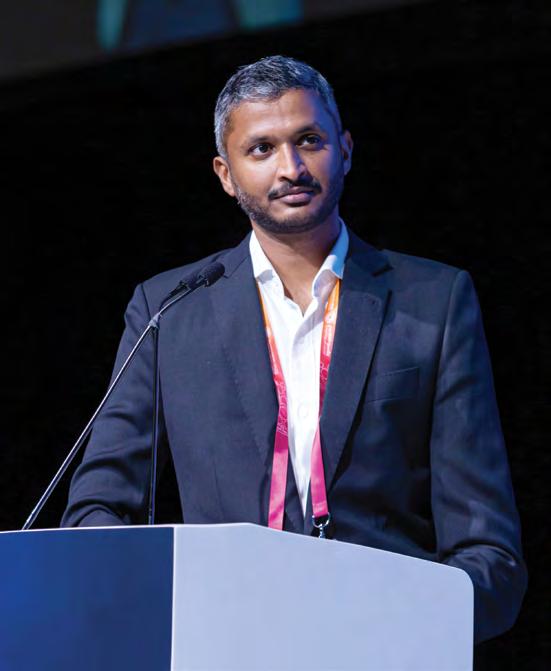
On September 21, 2022 at the Etihad Museum in Dubai, the UAE Ministry of Health and Prevention (MOHAP) launched of the 2022 edition of the BE BOLD program, a first-of-its-kind federal initiative in the UAE that aims to design the future of healthcare by building on the capabili ties of talent in the country.
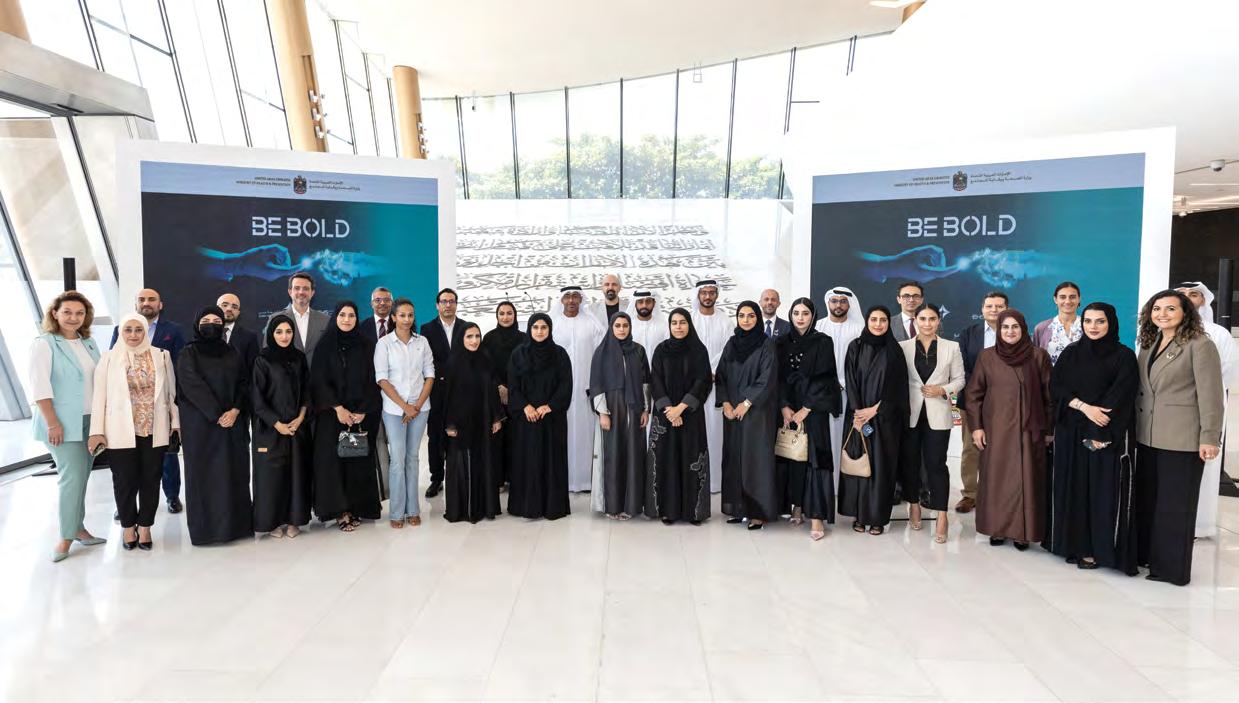
This year’s instalment of BE BOLD will be running from September 21,
2022 to November 24, 2022 under the motto #TogetherForHealthUAE, and it is being staged with the support of Dubai Health Authority (DHA), Emirates Health Services (EHS), Viatris, Klaim, and Johnson & Johnson
partners. The program has been built in
partnership with Entrepreneur Middle East Impact, the educational arm of the region’s leading publication on entrepreneurship, Entrepreneur Middle East, which develops programs designed to encourage and enhance innovation within companies in both the private and public domain.
BE BOLD 2022 will bring together a group of 20 participants belonging to different parts of the healthcare sector, which include public and private sector professionals, seasoned entrepreneurs, government stakeholders, as well as academia in the field, to help design the UAE government’s national health programs of the future.
At the end of the BE BOLD 2022 program, the participants will pitch their innovative national healthcare ideas to a jury panel, and the winner will receive financial and practical support from MOHAP, Entrepreneur Middle East, DHA, EHS, Viatris, Klaim, and Johnson & Johnson in order to implement their proposal on a national level in the UAE.
Commenting on the launch of BE BOLD 2022, MOHAP Undersecretary H.E. Dr. Mohammed Salim Al Olama said, “We have launched the program in implementation of the directives of H.H. Sheikh Mohammed bin Rashid Al Maktoum, Vice President, Prime Minister and Ruler of Dubai, who constantly urges the adoption of a designthinking culture in all areas of government work, and to collaborate with the community to design innovative solutions to potential challenges, in line with the principles of the 50th and the UAE Centennial Plan 2071.”
Speaking at the event kicking off BE BOLD 2022, Saqr Al Hemeiri, Chief Innovation Officer and Director of Strategy and the Future at MOHAP, said, “Five years ago, our dream

↑ At the launch of BE BOLD 2022, emcee Sally Mousa moderating a discussion with Tom Loney, Associate Professor for Public Health and Epidemiology at the Mohammed Bin Rashid University Of Medicine and Health Sciences in Dubai, Tamer El-Sallab, Head of Gulf and Levant Cluster at Viatris, and Karim Dakki, co-founder and CEO of Klaim.
was to find a way to work in collaboration with the private sector and government to enhance the healthcare sector of the UAE. Today, we are realizing that dream with the second edition of the

BE BOLD program.”
The official launch event was also attended by H.E. Dr. Yousif Mohammed Al-Serkal, Director-General of EHS, H.E. Dr Hussain Abdul Rahman Al Rand, Assistant Undersecretary for the UAE Public Health Sector, Dr. Amin Hussein Al Amiri, Assistant Undersecretary for the UAE Health Regulation Sector, and H.E. Salem Al Darmaki, Advisor to the UAE Minister of Health and Prevention. Also present were leadership and representatives from the Dubai Health Authority and other program partners.
Speaking at the event, Wissam Younane, CEO of BNC Publishing, the media house behind Entrepreneur Middle East, said, “As the first initiative of its kind in the UAE, BE BOLD is staying true to its name in that it is attempting something daring, some thing new, and something innovative within the healthcare sector of the UAE, which can have not }}
just a sizable, but also a meaningful impact on the population of the country.”
Meanwhile, Ameera Al Hamed, Head of Innovation and Future Foresight at MOHAP, said that the second edition marks a milestone for the BE BOLD given its collaboration with entities “that are already reinventing the healthcare sector in the UAE.” The event also featured a panel discussion on building healthcare ecosystems in the UAE that hosted Tom Loney, Associate Professor for Public Health and Epidemiology at the Mohammed Bin Rashid University Of Medicine and Health Sciences in Dubai, Tamer El-Sallab, Head of Gulf and Levant Cluster at global pharmaceutical company Viatris, and Karim Dakki, co-founder and CEO of Dubai-based healthtech startup Klaim, in a conversation with emcee Sally Moussa.
The panelists highlighted the importance of including entrepre

neurs and intrapreneurs in creating new healthcare projects, with Loney saying, “While we need horizontal communication, we also need vertical communication. So, when a problem is being identified, you absolutely need people with different ways of
approaching and solving it.” In line with this, Dakki and El Sallab advised the BE BOLD 2022 participants to always be open to discussions and new insights. “There is always a hidden cause that isn’t being addressed, and it can lead to a solid solution that can really change healthcare. So, don’t come into it with preconceived notions,” El Sallab added.
The BE BOLD 2022 program will feature 14 personal training courses, three main semesters, and 60 hours of online instruction. Also, highprofile experts in future foresight, leadership, and design thinking from the UAE, Germany, the Netherlands, Colombia, the US, China, and Canada will be taking part in the initiative, shedding light on three key pillars, including public health, mental health, and women’s health.
The BE BOLD program responds to the directives of H.H. Sheikh Mohammed bin Rashid Al Maktoum, UAE Vice President and Prime Minister and Ruler of Dubai, to adopt a culture of design thinking in all fields of government work, and to work in partnership with the community to design innovative solutions for future challenges in line with the principles of the Fifty-Year Charter and the UAE Centennial Plan 2071. beboldme.com

FIVE YEARS AGO, OUR DREAM WAS TO FIND A WAY TO WORK IN COLLABORATION WITH THE PRIVATE SECTOR AND GOVERNMENT TO ENHANCE THE HEALTHCARE SECTOR OF THE UAE. TODAY, WE ARE REALIZING THAT DREAM WITH THE SECOND EDITION OF THE BE BOLD PROGRAM.↑ Saqr Al Hemeiri, Chief Innovation Officer and Director of Strategy and the Future at MOHAP, at the launch of BE BOLD 2022. ↑ Guests at the launch of the BE BOLD 2022 initiative at the Etihad Museum in Dubai.
 BY
BY
On September 15, 2022, at Sofitel Dubai The Palm, Entrepreneur Middle East staged the Leaders in Fintech Awards 2022, sponsored by du and in partnership with in5 Dubai, to recognize the individuals and enterprises that are shaping the future of the MENA region’s fintech ecosystem.

The second instalment of this annual event saw a total of 25 awards being presented, with all the winners celebrated as the movers and shakers of a space that is predicted to be worth US$3 million by the year 2026.
With the winners ranging from innovative banks to startup disruptors in the cryptocurrency space, the Leaders in Fintech Awards 2022 proved to be a celebration of the innovations that will be powering the Middle East’s fintech arena today and into the future.
“It’s no secret that fintech is one of the most exciting and


lucrative industries in the world of today, and the potential that the MENA region presents in this sector is truly unmatched,” said Wissam Younane, CEO of BNC Publishing, the media house behind Entrepreneur Middle East, at the gala event. “After all, our region is home to 85 million of the world’s two billion unbanked adults, and while they may be often disregarded by large-scale financial institutions, they also represent the opportunity that is ripe for the taking- and the innovators and entrepreneurs in this room tonight are the forerunners in this field.”
“It is with that thought in mind that I would like to applaud each and every one of you for making your way through an industry that is definitely filled with hurdles, and yet, getting past all of them to work on realizing a better financial future for every single one of us,” Younane added. “Thank you for all the work that you do, and we at Entrepreneur salute you for your efforts.” fintechawardsme.com


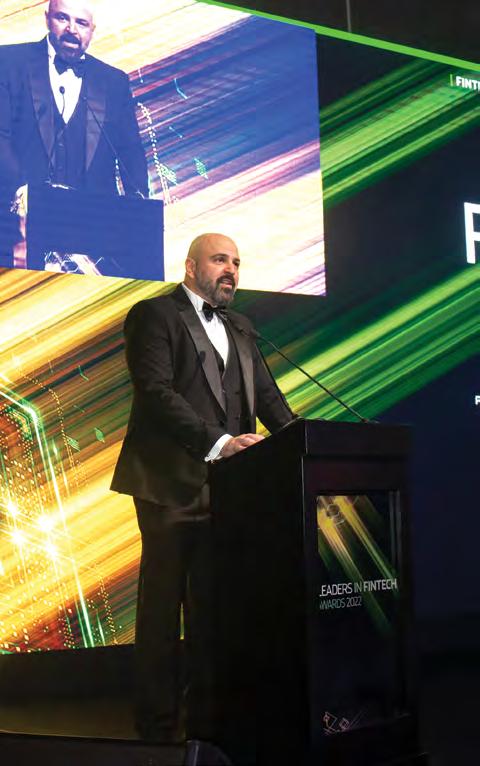





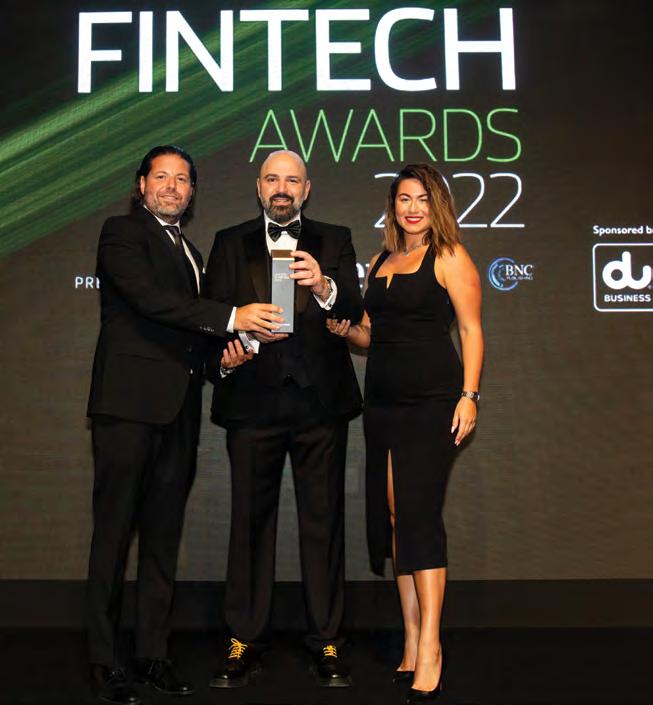








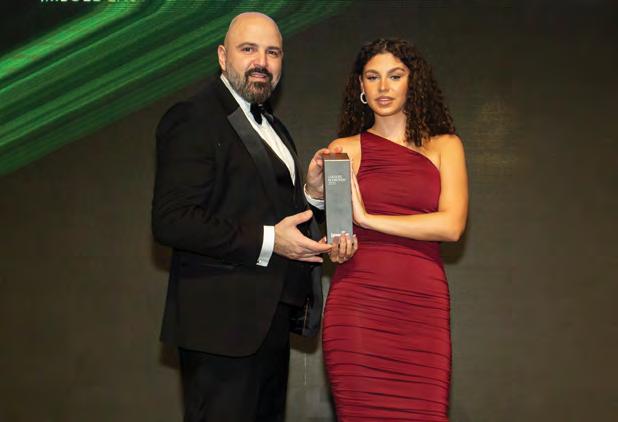



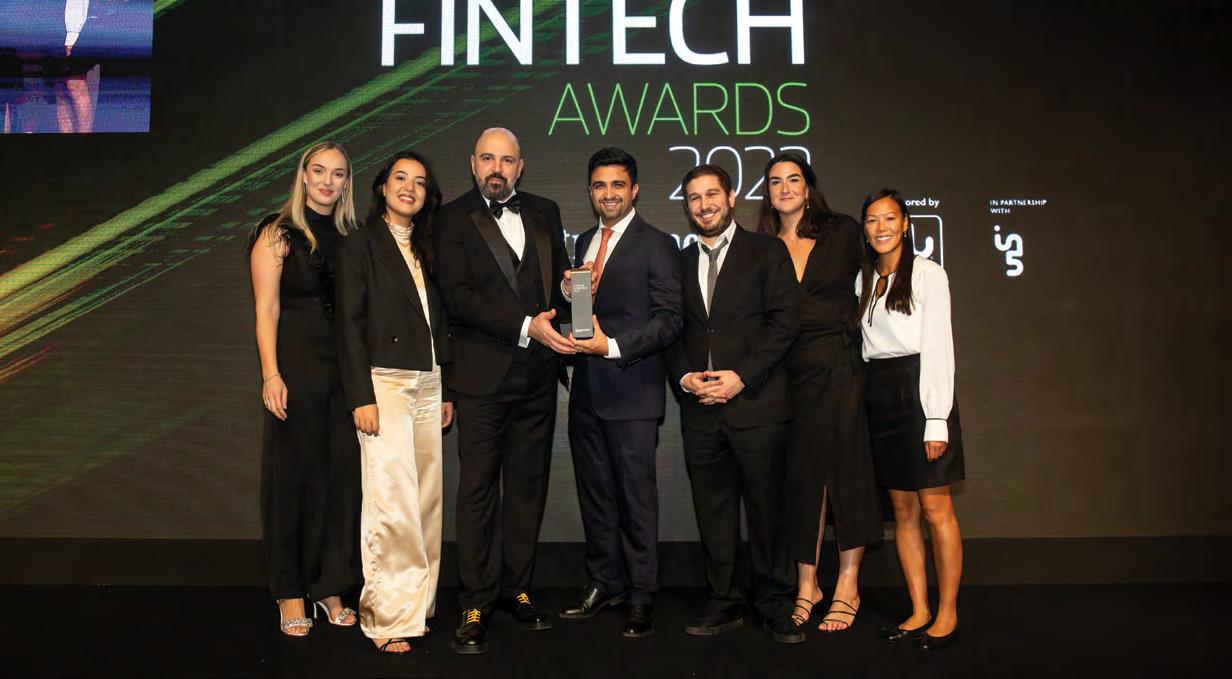



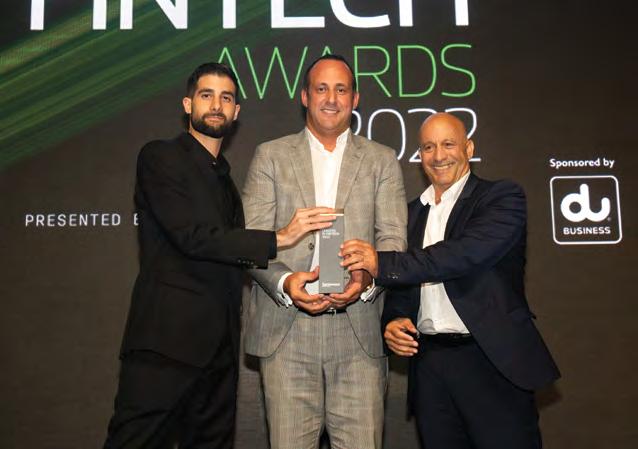

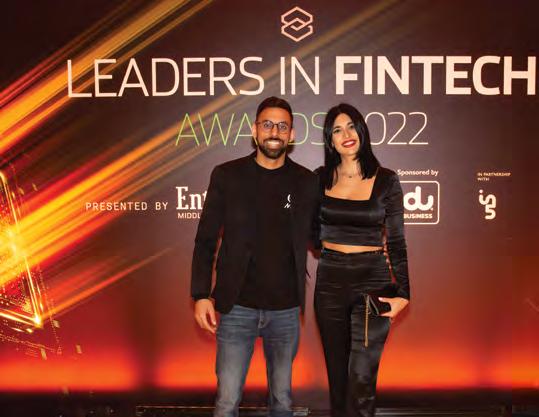


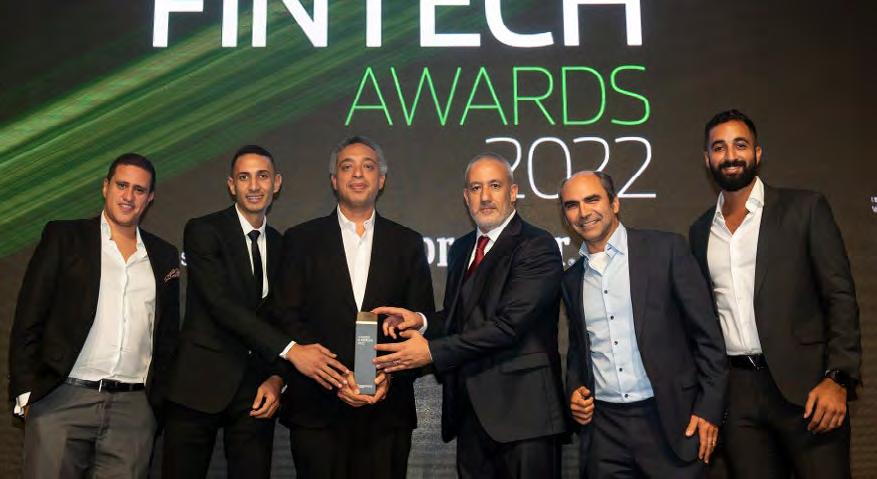



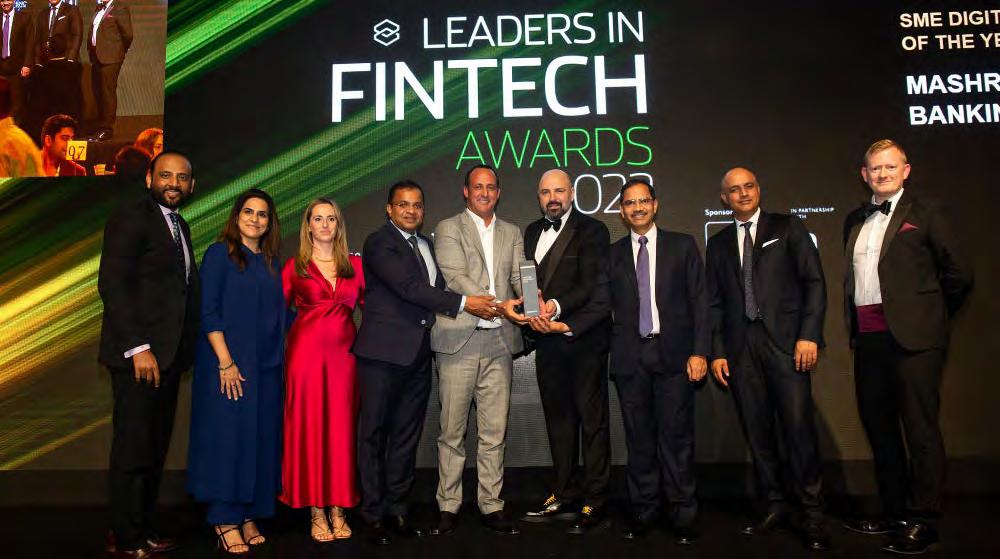







 by AALIA MEHREEN AHMED
by AALIA MEHREEN AHMED

When Layla Ghaleb and Mahmoud Shoukry founded their Cairobased dance company Goodspace in July 2021, they did so with a clear vision built upon their collective experiences as active participants in Egypt’s dance community. After all, Shoukry has been a choreographer for over 15 years, while Ghaleb is a selftaught dancer who became a professional choreographer and teacher. “We both always dreamed of creating something special; a space that is safe for everyone, for people from all walks of life to train and grow and excel,” Shoukry says. “Layla and I discussed it randomly a couple of years ago, actually- our hopes and dreams for the Egyptian dance community, and how we have so many local talents here that deserve exposure and a spot in the international community’s limelight. I guess that’s where it all started.”

The business that Ghaleb and Shoukry launched is today demarcated into three main verticals: Goodspace Studios, a dance studio open to people across all age groups, Goodspace Talents, a dance agency, and Goodspace Events, the firm’s event management arm. “Goodspace Studios personifies our company slogan, ‘Good people, Good company, Good souls,’ by aiming to create a safe space for athletes, dancers, and performers to train towards the betterment of their craft, and also welcomes hobby ists -young and old, and from all walks of life- assist ing them in their growth physically, mentally, and emotionally,” Ghaleb adds. “Dance opens you up; it invites you to understand and comprehend everything that is within you and outside you, be it spiritual or physical. Within that exploration and under standing and openness, there is a sense of vulner ability that does come along with it, and when that is met with love and accep tance, tolerance and compassion, no words can express what that can do for the soul!” Shoukry adds to Ghaleb’s statement, saying, “That is what we’re aiming to do at Goodspace: help people grow, and have love for themselves, and everyone else around them!”
At this point, I must mention that despite this interview being done via
email, Ghaleb and Shoukry’s innate passion for dance, and the goodness they hope to spread through it, is palpable through their written replies. Like many across the globe who have a keen interest in the performing arts, the co-owners cite the likes of Michael Jackson and Madonna as their inspira tions, with Ghaleb specifi cally mentioning husbandand-wife choreographing duo Keone Madrid and Mari Madrid’s interpreta tion of the Bob Marley song, Is This Love. “Watching their interpretation of Is This Love was unlike anything I’d ever seen or witnessed before,” she recalls. “It told a story of a love that is old and timeless, and the innocence that can live on within two people’s love. It was the first time I realized that dance doesn’t just have to be about fun and sass, but it can also convey a story, a message. You can share your feelings and emotions and thoughts in a way that is soul-baring.”
Having imbibed such sentiments and experiences into their teaching responsi bilities, it comes as no real surprise when Ghaleb and Shoukry say that witnessing their students gradually journey into the process of becoming instructors and teachers themselves has been one of their biggest entrepreneurial achieve ments. Goodspace Studios,
in particular, seems to already be enabling the sense of community and camaraderie that both co-founders so desperately hope to achieve. “Some times, we’ve had people who are too young to attend advanced classes come in and kill it, and other times we’ve had people who are in their thirties and forties dancing for the first time,”
Shoukry says. “It’s so refreshing to see their passion ignited and to see them grow into the performers that they want to be, even if it’s just for fun. That’s another thing that we love about this job- we are always pleasantly surprised by the different people from all walks of life that come and join our classes in search of self-love, empow erment, connection, love, and community!”
↓ Mahmoud Shoukry and Layla Ghale, co-owners, Goodspace, want “to help people grow, and have love for themselves, and everyone else around them!”

WE HAVE SO MANY LOCAL TALENTS HERE THAT DESERVE EXPOSURE AND A SPOT IN THE INTERNATIONAL COMMUNITY’S LIMELIGHT. I GUESS THAT’S WHERE IT ALL STARTED.
“To be able to say that we are getting these amazing instructors and choreog raphers in one place at the same time for the first time ever in the Middle East does qualify as a milestone I think- pos sibly the milestone of milestones!” Ghaleb says. “We are thus looking forward to celebrating our one-year company anniversary alongside this amazing line-up as well as everyone else that will be attending the camp! It will be a ‘Goodweekend’ indeed; an anniversary to remember!” Open to those who possess beginner, intermedi ate, as well as advanced dance education levels, the camp is welcoming partici pants as young as 10-year-olds. And when asked what he hopes for the participants of Goodweekend, Shokry replies, “We want people to experience something they’ve never experienced before in the Middle East- an intense, rigorous training schedule where you will dance, learn, and connect with the best of the international dance commu nity. We want people to walk away with a newfound love and appreciation for everything that is related to the performing arts and dance.”
But goals centered around using dance to create a tight-knit community is just one part of what Shoukry and Ghaleb have set out to do- the other aim is, of course, to build a successful business. Within just a year of its launch, the company has been instrumental in a wide array of commercial projects, including a video for Adidas’ Run For The Oceans campaign, an advertise ment by UAE-based telco Etisalat that featured Egyptian actors Khaled El Nabawy and Sherine Reda, as well as a music video for Arab singer Balqees Fathi. “The concepts of conscientious ness and succeeding are not antithetical notions; you can truly do both,” Shoukry says. “Some people don’t understand that just because we want to give back to the community does not mean that we don’t want to be a successful business! You can carry out and implement an ethical business that betters the community, without having to compromise your morals or ethics for commercial success.” Ghaleb points out that overcoming this preconceived notion has been one of the many
societal hurdles faced in building Goodspace. “The process of overcoming it is still ongoing, I suppose, but in terms of how we deal with it, we do it the way that anyone should deal with anything really: just be genuine,” she says. “We are living our truth and people that have worked and trained with us see that- they see our intention, our love, and our dedication to the dream that is a bigger and stronger community of performing artists that love and support each other.”
At the time of writing this piece, the co-founders are confident that they will reach their biggest milestone yet during an event planned for the end of September 2022: Goodweekend, an international dance camp organized by its aforementioned events arm Good space Events, that will feature a string of globally renowned choreographers such as Los Angeles-based Nicole Kirkland and Emmy-nominated Melvin Timtim. Set to run from September 28, 2022 to October 1, 2022 in Cairo, it is being pegged as the first-of-its-kind interna tional dance camp in the Middle East.
And this camp will simply prove to be the first step in the many other goals Goodspace hopes to achieve moving into the new year, says Ghaleb. “I just look forward to seeing everyone’s faces and smiles at Goodweekend for now, but I think 2023 will be another year to grow and better ourselves,” she says. “As individuals, we’ve put our blood, sweat, and tears into this, and have made a lot of sacrifices individually and collectively to ensure that our dream comes to life. So, 2023 will be the year we give back little to ourselves, so we can keep the train going.” But Shoukry adds that taking things one step at a time will be the motto that drives Goodspace forward. “We are still unsure what our next step is going to be, so for now we are focused on making Goodweekend the best experience that it can be,” he says “Going into 2023, who knows? Maybe we’ll open up a new branch, maybe we’ll dive into organizing another camp… we don’t want to take on too much all at once. For now, we’re just enjoying the ride.”

WE WANT PEOPLE TO EXPERIENCE SOMETHING THEY’VE NEVER EXPERIENCED BEFORE IN THE MIDDLE EASTAN INTENSE, RIGOROUS TRAINING SCHEDULE WHERE YOU WILL DANCE, LEARN, AND CONNECT.


SALIK
Wemade is perhaps best known for being the makers of the incredibly successful massively multiplayer online role-playing game (MMORPG) series, Legend of Mir, which has fans from around the world numbered in the hundreds of millions- in fact, Chang proudly tells me that more than two decades after its launch, the title’s intellectual property continues to be as loved by (and relevant to) gamers today as it ever was. I find this to be an indication of how Wemade has seemingly cracked the code of creating something timeless, while also staying in tune with the times- and this can also be seen in the transfor mation it is currently ongoing from being a tradi tional video game company to now becoming an open platform for blockchain games.
For the uninitiated, blockchain games are video games that make use of blockchain-centered technologies like cryptocurrencies and non-fungible tokens (NFTs) in their gameplay. Presently a nascent industry, Wemade has set out to position itself as a frontrunner in this space with the launch of Wemix, its open blockchain gaming platform, and its eponymous token. While there are only 17 games hosted on Wemix as of October this year, it’s already home to a smash hit: MIR4 Global. Launched by Wemade in August last year, MIR4 Global went on to secure 20 million cumulative users within just a year.
for the blockchain gaming ecosystem, especially considering that the game reached 6.5 million monthly active users in just a few months, despite having no formal marketing campaigns to support its launch. “I think it’s safe to say that MIR4 Global is the most successful blockchain game ever,” Chang says. “The game proved that it is possible to make an enjoyable, well-made blockchain game for players, a game that people would love to play not just to earn cryptocurrencies, but for the sheer fun of the gameplay.”
OPPOSITE PAGELEGEND OF MIR2, the original Hallyu game, has attracted more than 500 million users worldwide. Even today, after more than two decades, Legend of Mir IP-based games continue to be played and loved by hundreds of millions of enthusiastic fans.
Note here Chang’s point about people wanting to play MIR4 Global purely as a game, and not just for the rewards it offers. This is a huge win for Wemade in the domain of blockchain games, and in order to understand why, Chang suggests starting by examining what differentiates them from their “traditional” counterparts. “Blockchain games are characterized by in-game assets that present both monetary value and real-world use cases,” he explains. “Originally, traditional in-game assets have been contained and trapped inside the game. When those assets are owned by the players instead of the gaming company, it gives them a sense of ownership. Users can now freely and in a seamless manner buy, trade, and stake their in-game assets. These elements set apart blockchain games from traditional main stream games.”
Let me start this piece with an admission that I knew little to nothing about South Korea-based game developer and publisher Wemade before I was offered an interview with its CEO, Henry Chang, when he visited the UAE in August this year. But my ignorance about the company says more about me not being much of a gamer, than anything else- after all, Wemade is a publicly listed billion-dollar-business whose offerings have been (and continue to be) made use of by hundreds of millions of people around the world. And when Chang tells me he was recognized by people on the streets of Dubai on account of the Wemadebranded jacket he was wearing at the time, it’s more than enough impetus for me to want to learn more about him and his company.
Now, it’s this opportunity to earn assets in blockchain games -usually cryptocurrency tokens of one kind or the other- that has lately led to the eruption of the play-to-earn (P2E) model in this landscape. “P2E was one of the most popular keywords in the gaming industry last year,” Chang notes. “In the crypto market, it’s treated as the next big thing. Although the stock prices of the gaming industries in Korea are stagnant right now due to microeconomic instabilities such as inflation, last year, the stock prices of the game companies skyrocketed when they mentioned the word P2E, NFT, or blockchain. The P2E model has been popularized in the press and by some crypto communities mostly because these tokenomicsfocused games are designed to provide economic gain- before anything else.”
And therein lies the problem that has materialized alongside the rise of the P2E model in the gaming ecosystem. “Creating games from the position of financial engineering, as opposed to from a game developer’s perspective, has led to higher barrier to entry. Players consistently cashing out and not contributing to the ecosystem, and games that lost their primary entertainment value and felt more like manual labor,” Chang explains. “P2E games are also associated
with social issues related to gaming addiction, and playing them as a full-time job deprives entire societies of their human capital and negatively impacts their productivity too.”
It is to subvert such consequences that Chang is pushing for greater adoption of what Wemade is calling a play-and-earn-and-pay model in the gaming sphere. “Because of the aforementioned issues and more, I do not believe a purely tokenomics-dependent P2E ecosystem is sustainable and scalable,” Chang says. “It is then necessary to go back to the essence of gaming, which was always about bringing entertainment value with well-made games. The play-and-earnand-pay model puts well-made games at the center of ecosystem, and it provides the basis of a sustainable ecosystem by incentivizing users who enjoy the game to not just play and earn cryptocurrencies or NFTs, but to invest their earned tokens back into the ecosystem by upgrading their characters, etc.”
This should explain why Chang sees the success that MIR4 Global has seen as such a great win for Wemade and the gaming landscape at large- the fact that it had more than 1.4 million concurrent users shortly after it launched is a testament to the sheer prowess of the game. “As many in the gaming industry know, this is an exceptional result for an MMORPG, which normally takes more time to go through and finish the game,” Chang adds. And Wemade isn’t sitting on its laurels- it’s already pushed out its latest offering.

“We recently released MIR M, the newest spinoff of the Legend of Mir series locally in June, with a global launch expected later this year,” Chang says.
“There has been some great initial response to MIR M, which makes me confident the global version will do even better than MIR4.”
All of this are good tidings for the blockchain games industry as well, Chang says. “Not only does it prove to the world that it is possible to make well-made games embedded with blockchain technology, but it also shows that gamers who have been accustomed to traditional Web 2.0 games for decades have embraced this new technology with open arms as well,” he says. This, in turn, is a shot in the arm for the bet Wemade has made on its Wemix platform. “As we further expand our Wemix platform ecosystem, we expect its part of revenue will grow exponentially,” Chang says. “Although the platform’s revenue is weak now, I expect Wemix to be at the center of our sales in the future. I firmly believe we are on the right track to succeed as an open blockchain game platform, similarly to what Apple’s App Store and Google’s Play Store have achieved.”
At this point, Chang acknowledges that there remains a certain amount of hesitancy toward blockchain games from the traditional gaming community at large- however, he also believes that it will subside as blockchain adoption becomes more prevalent in our world. And that, he predicts, is when Wemade’s early investment in this space -i.e. Wemix- will allow it to become the dominant global platform by default. “Our ultimate goal is to create a mega ecosystem, and become the Steam of blockchain games,” Chang says- for the non-gamers reading this, Steam is the largest distributor of personal computer games in the world today.
“Every year, there are around 50,000 news games launched, and I believe that in the near future all these games will be blockchain games,” Chang continues.
“In-game items have always existed even in Web 2.0 games; however, with blockchain technology, users are able to take those in-game items out into the real world enhancing the user gaming experience. By putting all our efforts into blockchain technology, we aim at becoming the global open blockchain game platform by default, enabling hundreds of new games to onboard our platform each year, and benefit from blockchain technology and our ecosystem even without previous knowledge in the blockchain space.”

At this point, in case of any of you think that this is a lofty ambition for Wemade to make in a fledgling industry that has also been rocked recently by a crypto winter, Chang is here to help disprove you of that notion. “Based on my 26 years of experience in the gaming industry, I firmly believe that blockchain gaming is the future,” Chang declares. “As a publicly traded company with over 20 years of corporate history, Wemade is well ahead compared to its competitors, and we will put everything we have into keeping it that way despite the current market conditions.”

→ Established in 2000, WEMADE is an international game developer publisher that has grown from a handful of passionate game pioneers to a group of over 1,300 game enthusiasts.
Chang admits here that as a relatively new technology, blockchain still has a long way to go in terms of regula tions, implications, and even applications- but from Wemade’s perspective, it represents an opportunity, rather than a challenge. “When Bitcoin was first introduced in 2009, like many people in the gaming industry, I didn’t believe it was special back then, and treated it like some sort of game money that players use in games,” Chang recalls. “I, alongside many of my colleagues, thought we knew everything about game money, and that it was absurd to use it outside games and in real life. But now, thanks to the few innovative people who recognized early the potential of the technology, and then utilized it to develop business solutions and industrial advancement, we have arrived to where we are today.”
Chang currently professes a steadfast belief in the potential (and power) of blockchain, and that is what he has channeled to lead Wemade through the instability that has been seen in the crypto landscape through the course of 2022. “Our response to the turbulence in the current market has been to focus on providing utility to the users, and making more investments and strategic partnerships to strengthen our position as a leading global open blockchain game platform,” Chang says. “Even back in 2018, during the previous crypto winter, we didn’t give up, and we spent human resources into developing our blockchain technology and services; we continue to do the same even now.”
Chang speaks with the confidence attained by working for 26 years in gaming- in fact, he started out in the industry when he was still a senior at college. His first job
was at Nexon, which was then a Seoul-based small business with fewer than 10 employees- today, however, it is one of the biggest game companies in South Korea, as well as one of the biggest listed companies in Japan.
Following a long stint at Nexon, he joined another game publisher, Neowiz, as its Chief Financial Officer, and then became Head of the Strategic Planning Division of Neowiz Games, before finally going on to lead Neowiz Mobile as its Chief Executive Officer. Chang then joined Wemade in 2013, and he was appointed its CEO a year later.

Chang’s career trajectory should make it clear that he is someone who is extremely well-versed with the industry he operates in, and that should serve as reason enough for why his viewpoint on the potential blockchain presents in this landscape shouldn’t be taken lightly.
“What’s interesting is that as someone who spent his entire career in the gaming industry, there is no doubt that role-playing games, like the MMORPG Legend of Mir series, already provide a similar concept to a metaverse, and it is interesting to see how the rest of the world is now embracing this new technology and concept,” Chang says. “I believe at the heart of the metaverse are games, and that there are a lot of exciting new developments to happen in the space within the near future.”
Chang reveals here that the MENA figures strongly in Wemade’s aspirations for the future, and he points out that MIR4 Global has been able to create a strong fanbase in the region. “MIR4 Global ranked first across the UAE, Saudi Arabia, and Qatar amongst role-playing games on the Google Play Store back in March 2022, and it has succeeded in maintaining its top three rank in multiple MENA markets even now,” Chang says.
“In addition, the MENA is impor tant from a blockchain development point of view. The MENA offers licenses for crypto coin platforms, and we are in the process of applying for one. Once done, we will move some of our development team to the region, and develop a state-ofthe-art blockchain platform and crypto hub.”
And it’s not just an increase in the Wemade user base that Chang hopes to see resulting from the MENA- he’s also hoping to see a rise in the number of stakeholders from the region as well. “Wemade is a listed company in South Korea, and I would like to invite MENA institutional and retail investors to buy our stocks and our WEMIX coin, which is listed in more than 25 exchanges around the world,” Chang says. “I believe both Wemade’s stock and the WEMIX coin present very attractive investment opportunities, as they are both liquid and under-valued considering their huge growth potential. I myself have been buying

WEMIX coin with my salary and bonus income from the market for the last seven consecutive months, and I do not intend to stop until I retire; I also have not and will not sell a single WEMIX coin.”
It’s interesting to note here that the conviction with which Chang speaks about Wemade’s endeavors in the blockchain gaming space today- it is truly in stark contrast to the perspective with which they were seen when the company was just starting out on them. “For the first three-and-a-half years, our block chain gaming business didn’t look like much from the outside,” he says. “But when MIR4 became the first commercial hit globally in August 2021, I was very thrilled to realize that I’ve been right all along. And during the past year, the excitement has been growing within me every day, at every moment.” Chang is thus watching with glee as the building blocks of a new digital blockchaincentric economy involving NFTs, decentralized asset organizations (DAOs), decentralized finance (DeFi), and more get put into place, and when it all actually comes together, he is aiming for Wemade “to become the dominant open blockchain game platform, as the number one global mainnet.”
Chang recently revealed details about WEMIX$, the stablecoin of its mainnet Wemix 3.0, during his keynote speech at the TOKEN2049 event held in Singapore in Septem ber. “Stablecoins must be stable,” he

said. “This is the first requirement. WEMIX$ meets that through 100% USDC [a digital stablecoin pegged to the United States dollar] reserve.”
Following that, Chang continued by listing “stable/native coin reflexivity” as a second requirement for a successful stablecoin. “When a stablecoin is doing well, it should affect the native coin,” he explained.
“The native coin must be able to cap ture the demand and trade of stablecoin. Thus, the reflexive relationship between stablecoin and native coin must be structured.” As a third and final requirement, Chang listed scalability, which WEMIX$ secures through Wemade’s DIOS protocol, which, in turn, will let it expand according to the ecosystem’s growth.
The aspirations Chang has for Wemade, along with the results it has already achieved with him at its helm, also serve as a testament to his leadership of the company, which, by the way, is a realization of a childhood dream he had to run “a big, great company.” “There’s an old
saying that ‘good things take time,’” Chang says. “When I make plans for business and new technology that will determine the future, I try to think for the long term, like, say, in ten-year periods. In 2018, all gaming companies were interested in blockchain games, and some entered the market. But they all gave up during the crypto winter that happened afterward. Wemade was almost the only company that kept up, because we thought it might take ten years to succeed from the start. I believe that setting up your vision, crafting your strategies, and taking steps to achieve your goal in the long run is the key to the success and growth of your company.”
This is clearly the same vision that is governing Chang as he oversees Wemade’s ongoing investments in the crypto realm. “We’re making investments in blockchain compa nies and projects with great potentials all over the world, and we have been quite successful in our endeavors, to put it mildly,” Chang explains. “We have been making

significant investments in blockchain and game companies to expand our Wemix ecosystem from its current gamecentric approach to later encompass all other types of x-to-earn models, such as move-to-earn, watch-to-earn etc. To do so, we invest and are heavily involved in the development of our portfolio of startups, based on our industry knowledge and blockchain expertise. The most recent examples of such investments were in the luxury fashion metaverse ALTAVA’s TAVA coin, and the watch-toearn short-form platform CELEBe’s FANC coin, and SNKRZ, a next generation move-to-earn project.”
Wemade is thus all set to continue its bold foray into the world of blockchain, but I cannot help but point out to Chang that questions and doubts continue to rise about the technology’s applications in the real world. Chang replies that he can identify with this sentiment- he too has wrestled with this query at one point in time, but he also believes he has found a response to it in the industry he operates in. “For me, personally, the most important question that every cryptocurrency has to answer is: ‘Where is this going to be used?’” The question is still valid now, and there are many coins out there that still can’t answer this question. I found that the answer lies within games- and that’s when I became certain that cryptocurrencies will flourish in games… When skeptics ask, ‘Where can we use cryptocurrency?’, games can provide answers,” Chang concludes.
“Setting up your vision, crafting your strategies, and taking steps to achieve your goal in the long run is the key to the success and growth of your company.”
Armed with lessons learnt through a successful career spanning more than 25 years, this communications-proturned-entrepreneur is now authoring her own book
by TAMARA PUPIC→ Maha Abouelenein’s prowess as an entrepreneur and digital communications consultant comes from running her strategic communication consulting firm, Organizational Consultants, with offices in the USA and Dubai, as well as its signature podcast, SavvyTalk
At one point during my conversation with Maha Abouelenein over Zoom, she holds a sweater label tag close to her camera, saying, “This is a certificate that basically says that it is an original piece of clothing that has been authenticated on the blockchain. This is the value of what we’ll be able to do with Web3, and this is why people need to learn and understand blockchain technology.”
Out of her living room in her home in the American state of Minnesota, Abouelenein would not be imploring me (and you) to take Web3 seriously if she was not sure that it would significantly change the way we live and work. And Abouelenein is someone you’d want to listen to- before moving back to the US in 2020, she had been working as a strategic communications consultant out of Egypt and the UAE for 23 years, and during this time, she had firsthand experience of the profound impact technological disruptions have had on the world at large. “I had a front seat into the internet being introduced into the MENA region, and then to the introduction of mobiles by launching almost every mobile network in the Middle East and Africa in more than 18 countries,” Abouelenein recalls. “And now, we’re about to launch into Web3 and non-fungible tokens (NFT) and become the thought leader in the space when it comes to how blockchain technology will impact brands, businesses, and our lives.”

It is therefore not surprising that Abouelenein now, again, has the edge over how brands and businesses should find their voice in this new world professed by Web3- she has already led communi cations for some of the leading projects in the space, such as the VeeCon 2022 mega-conference hosted by VeeFriends, the NFT project run by acclaimed entrepreneur Gary Vayner chuk, aka GaryVee. Her prowess as an entrepreneur and digital communica tions consultant comes from running her strategic communication consult ing firm, Organizational Consultants, with offices in the USA and Dubai, as well as its signature podcast, Savvy Talk. Besides managing the personal brand public relations for Vaynerchuk, Abouelenein also offers her advisory services to a clientele that includes noted Indian-American author Dr. Deepak Chopra and Dubai-based influencer-cum-entrepreneur Karen Wazen, as well as acclaimed compa nies like Target and Emirates Airline, alongside Web3 startups like Utopia, Bedu, and Vayner3, among others. However, it is indeed news to me that Abouelenein wants to talk with me now about an old-fashioned, paper back book, and not just any book, but a book based on her personal story. “I
want to tell my story, because I want to inspire people,” Abouelenein says. “I want to inspire women who want to learn how both to take care of their parents and build their own careers, entrepreneurs who don’t know how to do communications but know it’s an important piece of their business, people who have setbacks in their careers but realize that they can switch gears, and create a new chapter for themselves.” And now, if you expect that this interview will give you a sneak peek into how Abouelenein has
done it all, you are right, it will; but her whole story will be available in 2024, when the book is expected to be published. “My measuring stick for life is based on what I am doing to bring value to others- personally and professionally,” Abouelenein says, when asked about the secret to her success. “Creating value behind the scenes is about finding that value equation that comes from knowing how to choose the right strategy, how to put in the work, and how to build the right network. It all comes with experience.”
Born to Egyptian parents in Manka to, Minnesota, Abouelenein earned her bachelor’s and graduate degrees at Minnesota State University, and started her career by interning for Weber Shandwick and also briefly working for General Mills, before mov ing to Egypt in 1997 to care for her mother who was unwell at the time, while her father accepted a new assignment as the dean of a business school in the UAE. In Cairo, she first worked for Egyptian billionaire and media and telecom mogul, Naguib Sawiris. “During my time there, I was part of the team that led the country’s first dual listing on the London and Egyptian stock exchanges,” Abouele nein recalls. “We did the largest initial public offering (IPO) in Egyptian history, and we also worked on the largest acquisition in the history of Egypt when we acquired 18 licenses from the telco, Telecel, in Africa.”
It was also in Egypt that, a few years later, Abouelenein was appointed Google’s Head of Global Communica tions and Public Policy. “I accepted the job on January 25, 2011, which was the day the Arab Spring started in Egypt, and so, I started only in March and worked on helping businesses leverage the economic impact of the internet,” she explains. “We launched Google Maps Street View and YouTube in the Middle East. We invested heavily in getting more Arabic content online, and building the internet ecosystem among developers and the tech industry.” Another of her key roles in her career was being the founding Managing Director of Weber Shand

wick for the MENA region, in which she set up 18 offices for the enterprise.
In between these high-profile stints, Abouelenein has also been committed to her Minnesota and Dubai-based communications firm Organizational Consultants, which has helped the likes of companies like Netflix, Udacity, and Careem to help with their public relations in the Middle East. “One of the biggest things that I’m really proud of that I did, for example with Netflix, is that when they first decided to come into the Middle East, they didn’t know
the importance of Ramadan,” Abouele nein says. “But by the next year, they had shows about food, cooking, and family, as well as television serials. So, by explaining the nuances of our Arab culture, we were able to make that bridge between East and West, and say, ‘This is like our Super Bowl, where the advertising is really high during this peak period, and so watching ad-free content on Netflix would be a huge advantage.”


} It’s ok to not know what you don’t know “I became the Managing Director of my own company in 2004 when I really had no idea how to do that. I was capable of doing the work and serving the clients, but I had no idea when it came to running a ‘company,’ or how to manage key pillars, like finance, human resources, operations, legal, and so on. Then, you learn the gaps, and you have to hire to fill them. It was a fast awakening of all of my shortcomingsjust because I knew about PR and comms didn’t mean I knew how to run a PR company. Thankfully, it's 2022, and I look back and take away so many lessons from that time. The big lesson here is: ask for help, and hire the right people you need to deliver. Be humble, and admit what you don’t know.”
} Believe in yourself “When all else fails, who can you rely on to show up? You! You have to put in the work; you have to believe you can. If you don’t believe in yourself, nobody else will. Self-doubt is a killer. I really struggled with putting myself out there, because I wasn’t sure anyone who care about what I had to say, or that nobody would listen to my advice. But I believed- I kept saying, if not me, then who? I can do this. And I did, one day at a time.
} Invest in yourself “Nobody will ever put you at the top of their priority list. You have to do that. Information is for free- you need to seek it. So invest in yourself, learn new skills, read newsletters, and blogs, watch YouTube videos- do what it takes to sharpen your skills and stay relevant.”
} Managing yourself is hard work “If you are an entrepreneur and you work from home, you feel me right now! Being disciplined around time organization, the structure of your team, of your day and all from home is not easy. So the best thing to do is the best that you can. Build a routine.”
} Build a network “Nobody can get ahead or win alone. Nobody knows how to do everything alone, you need a network. How much time are you spending on that network- building, nurturing, growing, and supporting it?
Time to get building!”
“IT’S ABOUT FINDING THAT VALUE EQUATION THAT COMES FROM KNOWING HOW TO CHOOSE THE RIGHT STRATEGY.”↓ Maha Abouelenein with Gary Vaynerchuk at the VEECON 2022 mega-conference
→ “The best part of being an Egyptian American is using my knowledge of both cultures and worlds to be a bridge between East and West in my career. I feel it’s what has given me an edge and propelled me to be in a unique position. I come from a place of tremendous gratitude for being in the right place at the right time when it comes to things like that.”
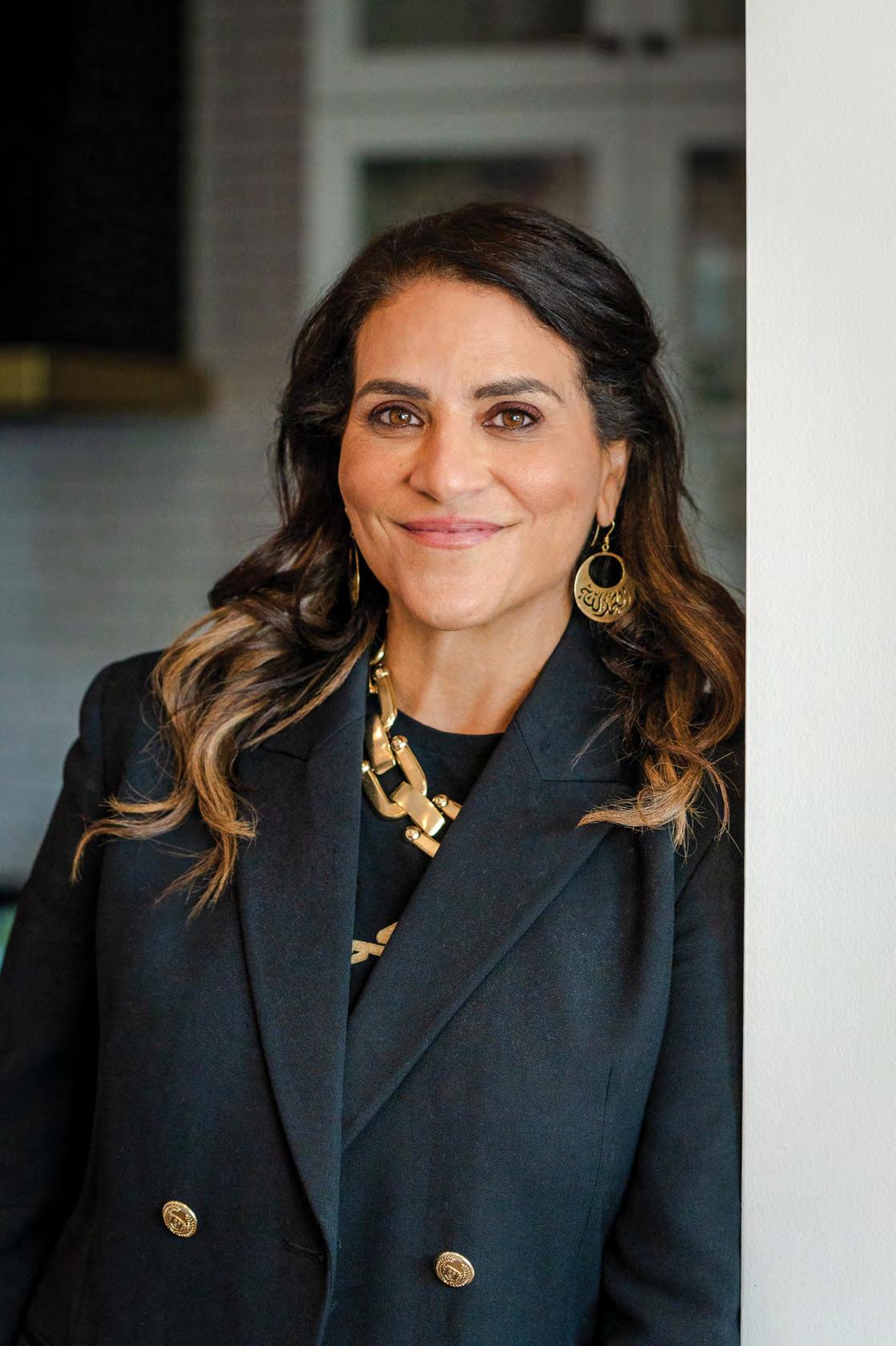
Her advice on these matters were heeded by the likes of Microsoft’s Bill Gates and Udacity’s Sebastian Thrun, whom she remembers telling to not go straight into business at meetings in the Middle East, but to focus a bit more on building personal connections. More recently, Abouele nein remembers her work with Vaynerchuk serving as a reminder on the importance of understanding one’s audience in order to avoid unnecessary mistakes. “I was very nervous when I first brought Vaynerchuk to the UAE, because he is in-your-face, very loud, high-energy, and all this kind of stuff, but he was actually completely intuitive at reading the room, respecting the culture, letting them lead, and listening first,” she recalls. Another story from her time with Vaynerchuk serves as a more practical response to my question to her to define what the value is that she brings to others. “It’s something that’s important to you, not to me,” Abouelenein replies. “And the secret sauce is finding out what you value the most, and then how I can deliver it for you.”
With Vaynerchuk, this meant realizing that, in addition to a 30-person team building his personal brand on social media when Abouelenein started working with him over five years ago, she had to look at how to bring him to new audiences through personal relationships, leveraging his speaking gigs and getting him in front of editors and news programs. “I had to find a lane to bring value because he had such a robust content machine team,” Abouele nein explains. “I started to think about what new relationships I could create for him when he is only a direct message away from anyone he wants to connect with. I started focusing on news organizations and media outlets, and new markets like Dubai, to reach new audiences. For example, last week, Gary was on The Drew Barrymore Show, a television show that appeals to more women, which is a target audience we really care about reaching.”
that, while she is a proud Egyptian, she cherishes Dubai for “what it stands for and what it enables people to do,” and aims to use her PR skills “to tell people about why they should do business with and in Dubai.” Mean while, to Minnesota, she is grateful for “teaching her American business ethics and values.” Abouelenein adds, “The best part of being an Egyptian American is using my knowledge of both cultures and worlds to be a bridge between East and West in my career. I feel it’s what has given me an edge and propelled me to be in a unique position. I come from a place of tremendous gratitude for being in the right place at the right time when it comes to things like that.”
Abouelenein has been writing her book from that place of gratitude, and she assures me that it will not be a tell-all book, but instead a collection of her memories and personal experi ences that are aimed at illuminat ing a larger mindset change. One example, she says, is that she wants to make the concept of switching gears in lives and careers more acceptable, especially among people in the Middle East. “You go to school, you get married, you have kids, you get a job are societal norms that exist everywhere, right? But I think now what we’re learning because of new words in our life, like disruption, or a side hustle, or a startup, is that it’s okay to switch gears and to pick your passion and to do things you love in addition to what you were traditionally expected to do, or planning to do.”
Our conversation now turns to the ambitious Emirate of Dubai where Abouelenein has a number of satisfied clients, including Dubai Future Foundation, Emirates Airlines, Careem, Al Ghurair Foundation for Education, Rain, and FitRepublik, to name but a few. She states
As our conversation comes to an end, I realize that Abouelenein’s career has been destined to blur the boundaries between opposing sides -be it the East and the West, or online and offline- and bring them closer together. And that is in line with the main goal that she wishes to achieve with her book- to put her knowledge in the service of everyone everywhere. “At this point in my career, I really am in a position to pick what I want to work on, and so what I think about the most now is how to scale my knowledge for everyone to learn,” Abouelenein concludes. “It is because everybody should be thinking about their personal brand, their reputa tion, or startups about their PR, and I don’t want to be on their payroll, but to give them the tools so that they can win on their own and learn critical communications skills they need.”

Gadgets and doodads that you might’ve missed out on, sourced by a tech aficionado.
by TAMARA CLARKE
FitBit Sense 2 is an advanced, healthfocused smartwatch packed with features to help you manage your overall health. With sensors that can detect signs of atrial fibrillation through an electrocardiogram (ECG) app and photoplethysmography (PPG) algorithm, you can keep tabs on your heart rate variability, skin temperature and more. It also includes the new Body Response sensor, which measures continuous electrodermal activity (cEDA) for all-day stress management. Plus, you can unlock extended services with Fitbit Premium such as Daily Readiness Score, which gives you personalized recommendations for your exercise regimen, and Sleep Profile, a deep dive into your sleep data and progress, as well as over 1,000 workout and mindfulness sessions. With more than six days of battery life, Sense 2 is the perfect companion to keep your mind and body active.



Amazon eero Pro 6 and eero 6, two all-new mesh wifi systems, feature Wi-Fi 6, which delivers faster speeds, higher performance, and better support for connected devices. Getting fast and reliable coverage throughout your home or office is easy with eero 6 devices, which offers Wi-Fi 6 coverage for more than 75 devices simultaneously.
Featuring a built-in Zigbee smart home hub, the devices connect compatible devices on your network, and so, you won’t be needing a separate Zigbee hub. Plus, eero Pro 6 and eero 6 work with your existing internet service, and are backward compatible with all eero generations, making it easy to expand or

There’s a new way to move around town with Switch electric scooters. The trendy transportation unit pack a powerful 450W motor, pneumatic 9.5-inch tires, and triple suspension. It’s also decked with front and rear lights to keep you safe during night-time rides when visibility might be a challenge. Every scooter can be connected to your smartphone via a Bluetooth Smart App, which allows you to control your scooter. The app also doubles as a dashboard to track various parameters of your scooter, like its speed on the road, distance covered, and battery level. Along with that, it comes with a one-click folding mechanism for easy stowaway. The scooter has a maximum speed of up to 30 km/h, and it allows you to travel 60 km per charge, so you can go full speed ahead with Switch.
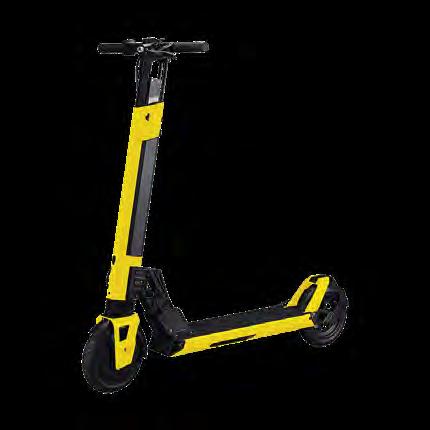
upgrade your network. All eero devices use TrueMesh technology, which helps you to enjoying 4K streaming, gaming, and conferencing without buffering and drop-offs. Plus, you can use the eero app to manage your network, pause the internet, share your network with friends or guests, and morewhether you’re at home, or on the go. With the eero “skill” for Alexa, you can also use an Alexa-enabled device or the Alexa app to manage features using voice commands like, say, “Alexa, turn on the guest network.” With an elegant, compact design that blends into any décor, eero devices fit seamlessly into your lifestyle.
TAMARA CLARKE, a former software development professional, is the tech and lifestyle enthusiast behind The Global Gazette, one of the most active blogs in the Middle East. The Global Gazette has been welcomed and lauded by some of the most influential tech brands in the region. Clarke’s goal is to inform about technology and how it supports our lifestyles. Talk to her on Twitter @TAMARACLARKE theglobalgazette.com

From better goods to better wardrobe bests, every issue, we choose a few items that make the approved executive selection list. In this issue, our picks include Missoni Men’s Fall/Winter 2022 line, Aesop skincare essentials for your next long-haul, and more.
Abstract Italian art from the 1940s takes centerstage in Missoni’s Fall/ Winter 2022 collection for men. Dominated by shades of gray and blue, along with vibrant touches of red, yellow, orange, and green, this collection offers distinctive graphics, highly tactile textures, and versatile pieces. Of course, knitwear in Missoni’s signature style takes the spotlight, especially in its chunky sweaters, unlined suits, and slim coats. In addition, to complete the informal and relaxed approach of the collection, the brand’s Mountain Calling capsule offers a selection of winter knits, sweats, and t-shirts, all designed with the brand’s colorful patterns and aesthetic. missoni.com


For the upcoming fall/winter season, Tod’s proposes a bold new take on the Di Bag, one of the house’s most iconic creations. Introduced in the late 90s, the natural leather Di Bag, named after (and worn) by the late Diana, Princess of Wales, was a hit when it launched, and it has since become an expertly crafted versatile must-have. the Di Bag features refined leather and its signature central-stitched seam and rolled handles, with techniques similar to those used by ancient saddle makers. The bad now also comes in various sizes and a wide color palette, thereby ensuring you sport an elegant and timeless look, no matter the dress code. tods.com


Got a long flight coming up? Then Aesop’s Departure Kit is the perfect companion for a jetsetter such as yourself. With an impressive seven products that are in-flight and cabin luggage-friendly, the kit covers everything for all your skin and body care needs. Our favorite is the Blue Chamomile Facial Hydrating Masque, which boasts an intense hydrating formulation to ensure your skin stays cool and refreshed. To use, simply apply a generous layer over the face and neck after cleansing. Keep on hand for in-flight use, or to refresh your skin

Channel your Top Gun dreams with a pair of timeless Aviator frames from Ray-Ban’s newly released capsule collection. The range offers has something for everyone: the Classic Aviator that generations have come to know and love, the Outdoorsman, which has been specifically designed for those who enjoy hunting and fishing, and the Shooter, which offers a vintage twist on the sunglasses. Each pair comes in gold with classic G-15 green lenses and the signature logo etched in the same tone, and take it with you when you travel in the exclusive camel-colored case produced for this collection. ray-ban.com



← OLIVETTI WAS FOUNDED AS A TYPEWRITER MANUFACTURER by Camillo

Olivetti in 1908 in the Turin commune of Ivrea, Italy. The firm was mainly developed by his son Adriano Olivetti, whose utopian vision led not only the company's worldwide expansion and commercial sucess, but also influenced business practice, politics, and culture.
Igrew up in the small Italian town of Ivrea where Olivetti, the famous designer and manufacturer of typewriters founded by Camillo Olivetti, established a working model for corporate responsibility.
Olivetti’s initiatives extended beyond his employees to the full community of Ivrea. While my parents did not work for Olivetti, I and others like me were given access to medical and sports facilities, art and culture initiatives, educational activities, and much more. And when added to the government’s provision of basic services, plus charitable initiatives for under privileged minorities, an ecosystem of incredible opportunity for all children was created.
Olivetti inspired me to see any business as a potential force for good, and its impact on my personal life drove me to launch C3, or Companies Creating Change- a platform helping emerging changemakers use the power of business to make a change in the world. My thinking was simple: if one private
company could impact an entire town positively for over a century, imagine what a community of innovative founders intentional about their impact could do, especially when backed by like-minded investors and operating in a conducive ecosystem?
Impact-driven founders already have plenty to focus on: building a great business solution aligned to their mission, creating a sound governance structure, securing funding, scaling their impact, while bringing financial returns to investors. Yet, despite the challenges they face, many pioneering C3 alumni have shown it is possible to use the power of business to bring systemic change to their community and the world. At C3, we believe a purposeled business contributes more to humankind than any other type of organization.
The MEA region’s challenges are increasingly daunting, despite decades of international aid, government investments, and generous private dona tions. C3’s vision is to help good
businesses become great at solving the world’s most pressing issues. In the MEA, we have a growing network of over 2500 impact-driven founders, 4000 experts, and 150 investment firms helping to accelerate over 200 startups from 18 countries via our flagship programs.
With a 97% survival rate, hundreds of millions of dollars raised, and incredible awards received, C3 alumni make us proud every day. Success stories include Desert Control, which successfully went public in 2021, Hydro Wind Energy, the energy and desalination startup that secured EUR50 million in funding pledges, and Almentor, which secured multiple rounds of funding and significantly scaled its impact and reach, to name just a few.
While C3 has enabled so many emerging changemakers today, we remember a time where being “impactdriven” was an idealistic theory. Few people believed the triple bottom line was attainable, and for most, it was not clear what it meant. Fortunately, and
a purpose-led business can realize
even more so after the COVID-19 pandemic, there is growing under standing of what it means to run an impact-driven business.

For example, if the focus of a business is on green mobility, the solution needs to be affordable to ensure adoption in emerging economies. When a blockchain-based marketplace is launched in energyscarce markets, the chosen block chain protocol needs to be efficient in terms of energy consumption. If a food security solution is introduced in arid areas of the world, it needs to leverage widely available natural resources (i.e. salted water), rather than scarce natural resources (i.e. fresh water).
Moreover, companies focusing on impact from the get-go should seek alignment between their mission and financial performance, avoiding having to find trade-offs between returns and impact. To make their impact targets a reality, and create

sustainable change, all stakeholders must create an environment where start-ups can flourish. NGOs, governments, academia, corporate organizations, and investors have an opportunity to join and support the journey of incredible changemakers. Now, impact investing is gradually becoming mainstream. BlackRock anticipates that by 2030, over 75% of its investments in companies and governments will be tied to net-zero emissions targets- up from 25% now. Likewise, Citibank provides thorough analysis showing how investors are moving from impact awareness to now contributing positively and measuring impact. At Global Ventures, where I am a Senior Partner and COO, we have partnered with incredible founders in health tech and diagnostics (Proximie, Helium Health, Altibbi, Valeo, Vivoo, Ilara, and Remedial Health), financial inclusion (Paymob, Nowpay, Mamo pay, Abhi, Tabby, Democrance, and
Pyypl), edtech (Nexford, Lamsa, and Meta School), as well as enterprise software as a service and foodtech. We have also invested in agritech (Red Sea Farms), sustainable food (Seafood Souq), future of work (Minly, Ogram, Neol), and green mobility (MAX).
For emerging economies, new solutions must address critical societal and environmental chal lenges such as food security to financial and healthcare inclusion, to accessible learning and job readiness. Investors who embrace this new wave of innovation see a lower risk -as suggested by the 97% survival rate and the successful fundraising rounds of C3-accelerated startups- and potentially higher returns for LPs.
We are confident grassroots solutions for, and from, the frontier will continue to attract backing from investors worldwide. Not only because of the growth potential from the large untapped markets of emerging economies, but also because supporting them will give humanity a better chance at realizing a global transition to a sustainable, just, and inclusive future. Now, Global Ventures and C3 are exploring jointly supporting early-stage regional changemakers. And on a personal note, I hope that Camillo Olivetti would be impressed.
Medea Nocentini is Senior Partner and Chief Operating Officer at Global Ventures, an international venture capital firm investing in startups with innovative business models and disruptive technologies, with the potential to transform emerging markets, and scale globally. She is also the co-founder and CEO of C3 (Companies Creating Change), a UAE-based social enterprise helping impact-driven entrepreneurs in the Middle East and Africa unlock their growth potential and maximize their positive impact on the community. global.vc wegrowwithc3.com
MUST
AND
CHALLENGES SUCH AS FOOD SECURITY TO FINANCIAL AND HEALTHCARE INCLUSION, TO ACCESSIBLE LEARNING AND JOB READINESS.↓ Adriano Olivetti at the production line.

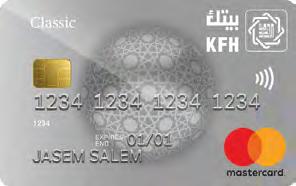

all them millennials or Gen Z; with or without the labels, businesses are learning to reflect the needs, habits, and beliefs of young people. After all, this is the generation that will soon dominate the workforce.

And nowhere is the shift more visible than in the demographically young MENA region. Coupled with the fact that in 2022, MENA economies are ranked among the world’s
fastest growing, making the case for attracting, understanding, and retaining young employees even more pressing.
Taking stock of the 25 years I have spent as an entrepreneur and a CEO, and drawing on my interactions with young talent, and also contrast ing today’s workplace with that of 25 years ago, these are the main directions I recommend that leaders and organizations in the Middle East explore over the next few years:
You’ve heard of storytelling, of always coming back to the “why.” The truth is, these aren’t fads; here this year, gone the next. They are expressions of the work and youth cultures of the 2020s that are strongly social and valuesbased. (The biggest companies out there -Google, Meta, Baidu- don’t make boxes; they connect people with content and with each other.) Your best job applicants want to see that your business lives and breathes integrity, transparency and sustainability. They want to know that growth and innovation, as well as improvements to the company culture, involve many people- and not just the privileged few in the top-floor office.
Enterprises in the pharma sector, for instance, don’t shy away from remind
ing their workforce, again and again that with every shipment, we improve a patient’s health, and a family’s wellbeing. Perhaps you are worried about going over the top? Don’t be. Today’s business culture loves the maverick. It’s okay to do things differently– and not only in Silicon Valley. Right from its inception, du, a UAE-based telco that I led, chose the path less trodden. It never sought to be just another carrier. Instead, it blazed its own path of fresh, dynamic customer experience, as well as edgy branding and innovative corporate values.
2/ Young employees are your number one client
The days of heads-down work in a cubicle are over. That is the reality, and it has nothing to do with loosening
control. The change is driven by customers who demand fast, conve nient, smartphone app-powered end-to-end solutions, enriched with a personal touch. Those solutions can only be provided by a workforce that thrives on working across corporate functions, sharing information, asking colleagues for help– and throughout, getting their hands dirty, in the spirit of joyful curiosity, exploration, and discovery.
The 2020s rule of thumb is that it takes happy and engaged employees to produce happy customers. In fact, your employees are a key customer. They deserve so much more than a desk and a laptop. This is why corporations like Marriott and Raiffeisen Bank are designing employee journeys and experiences and rolling out people-first initiatives. After the COVID-19 pandemic, the newfound flexibility and employers’ willingness to try new paths and formats is what I like to call the COVID dividend. The world has changed, boundaries have blurred, and, at times, disappeared. More than anything else, young staff want the opportunity to grow. It may well be that their career trajectory will lead them outside your company– to an ecosystem partner, a regulator, an incubator. They may also be keen to take sideway or diagonal steps in their careers– for example, through an overseas posting. As an employer, you need to embrace and anticipate these trends, instead of fighting them.
3/ Don’t preach. Empower– tangibly, visibly, practically Much has been said about Gen Z as the first generation of true digital natives–people who never experienced life without internet connectivity and data-powered gadgets. What is important for employers to distinguish is that digital means more than moving things online- just like new ways of working aren’t just about work from home. As powerful and omnipresent as technology has become, it is first and foremost a platform, a conduit to doing things better, faster, with sharper feedback. What you need to build on
CROWDSOURCING, HACKATHONS, AND OTHER TECH-ENABLED EVENTS COST VIRTUALLY NOTHING TO SET UP AND ORGANIZE. YET THEY CAN REVOLUTIONIZE THE WAY YOUR WORKFORCE REACHES OUT TO OTHER DIVISIONS AND MARKETS.
top of this platform is a culture of peer learning, collaboration, and experi mentation. At the Lambo rghini factory near Bologna, Italy, young engineers some times relax by competing with each other in virtual racing. Is it all fun and games? No– it’s also a smart way to improve their collaboration skills, observe new behaviors, and feed off the raw energy and insight of their peers in the room.
Similarly, crowdsourcing, hackathons, and other tech-enabled events cost virtually nothing to set up and organize. Yet they can revolutionize the way your workforce reaches out to other divisions and markets, rapidly pools their expertise, and solves real-world problems your company is facing. Need to learn the ropes first, or pick up a bit of inspiration? Not to worry: in business hubs like Dubai, hackathon sessions are in progress round the clock– focusing on every thing from citizen wellbeing and talent strategies, to health tech and blockchain.
There are no two ways about it: in this day and age, executives who don’t nudge their workers towards these learning opportunities are not leaders!
Meanwhile, big organiza tions are increasingly adopting agile ways of working– grouping their staff into squads and tribes, letting teams self-organize and pull work towards themselves, and moving decision-making down towards the customer-fac ing frontline. Empower ment is the name of the game. The good news is that you don’t need to be a giant
like ING or Rabobank to dabble in agile processes. Making meetings a brisk, standup affair in front of a whiteboard, allowing product developers to run through sprints and create prototypes at their own pace– all these are great ways to shake things up. Not only that, your staff will quickly learn that with making their own decisions comes responsibility, with autonomy comes the need to align with others, and freedom works best when it plays out in an agreed framework. Companies including Gucci and Accor Hotels have gone as far as setting up “shadow boards” composed of next-genera tion workers, distilling the young perspective into their corporate strategy.
4/ Collect feedback and make decisions based on data
With old ways ceding ground to new ways just about everywhere, how do you know what is working and what isn’t for you and your company? The simple answer is: use data. With the ubiquity of digital, data is the one thing of which there is no shortage. As a matter of fact, its volumes are growing exponentially.
Making decisions based on facts and evidence will work wonders for the quality of how your business is run. It will melt away biases and office politics. Not least of all, it will curtail unhealthy meddling by bureaucracy and old boys’ networks, desperate to retain their iron grip on how things are done around here.
Gathering people round on Zoom? Make a conscious
effort to run quick surveys, and collect on-the-spot feedback. But, in a tradi tional organization, what is it that typically happens with feedback? That’s right: nothing at all. Therefore, as a next step, wherever possible, act on that feedback. If you show your young staff that you have listened to and implemented their ideas, it will earn you loyalty that money can’t buy. Even if it boils down to a trivial matter of cutting down on paper towels, or picking the preferable type of coffee machine for the office pantry, the underlying message is paramount. Companies like Cargill have learned to collect employee feedback on a daily basis. It is truly the lifeblood of the modern organization.
5/ Your personal leadership is needed– more than ever before
With these dramatic transitions afoot, maybe leadership isn’t even needed anymore? Wrong. More than ever, young workers need access to leaders who will coach them, ask questions, and provide a sense of perspective when necessary. To use one example out of many: the 24/7 avalanche of informa tion, the instant and often random access to data points, the hypermediated age we live in, where our attention has become the main currency- what is absent from these trends is healthy filtering; a good old human sense of adequacy and measure.
An act as simple as pointing out, at the right moment, that a [social] medium very often is the

message, and that it may be projecting a fantasy which is quite divorced from reality can go a long way to instill confidence and critical judgment in young people. So is explaining that there was once a world and a society that predated the internet, and where humans struggled with similar issues as they do today– personal ambition, work aspirations, fairness, and social accep tance. Granted, some things change explosively, and other things –the underly ing, invisible ones– remain the same, through the ages. In many contexts and in the long term, that may well be the most important lesson a leader can share.
Osman Sultan is co-author with Bruno Lanvin of The Future Is Young: How Technology, Talent And Innovation Can Help Us Face The Most Pressing Challenges Of Our Time published by IMD. imd.org/ research-knowledge/books/ future-is-young/

Dragons are coming.”
Appearing seemingly overnight on the Egyptian coastal town of El Alamein, the tag line was enough to create a significant level of intrigue in the lead up to the launch of one of the most highly anticipat ed television series in the world: HBO’s House of the Dragon.

Alongside a 1,000-drone activation in Riyadh, a digital media campaign in AlUla, and an immersive screening in Dubai, the team at UAE-based streaming platform OSN+ engaged in a fully comprehen sive campaign that resulted in the platform’s most successful premiere to date. Following a tightly scheduled marketing campaign that captured the attention of the region, the OSN+ marketing team utilized traditional channels and
branding, layered with newer tactical strategies that were more disruptive. This was combined with wide-ranging elements of public relations (PR), social media, radio, and creative to establish a fully holistic campaign that sought to generate interest and increase subscriber numbers in what is fast becoming an extremely competitive and saturated industry.
“OSN+ had a big task of bringing this all together,
What marketers can learn from the OSN+ campaign to promote House of the Dragon
through working directly with HBO on approvals and creatives, to creating a 360-strategy involving social media and PR, and essentially getting four different activations together in a timeframe of one month,” says Ashley Rite, VP of Marketing and Growth at OSN+. “It was a huge opportunity for us as well, considering the success of its predecessor, Game of Thrones, which at the time of the finale had been OSN’s most successful episode premiere so far. So, we definitely had to go big for this one.” With that thought in mind, the OSN+ team, through a phased campaign, planned around reigniting interest of Game of Thrones fans, while engaging with a new audience, building momentum through trailer releases and teasers to generate excitement, and then successfully sustaining this momentum through continued buzz after launch.
A huge component of the campaign’s success was its focus on events and activations, most
of which took place in August ahead of the official launch of the series on the 22nd of the same month, engaging not only media and influencers, but fans across the region by bringing inclusivity, community, and -of course- a sense of fear of missing out (FOMO) through the campaign. The activations were also carefully curated based on insights and trends in each market at that time of year, where it was not only important to find suitable locations, but also crucial to collaborate with the right partners, like Gamers8 in the case of Riyadh, as well as a strong influencer strategy for amplification in all markets. For the screening event, the team chose to steer away from a traditional cinema setting and instead looked to creative
spaces, like the Theatre of Digital Art in Dubai, to create an immersive experience and bring an Instagram-able concept to life. In fact, technology played a significant role in this campaign, beginning with the unique augmented reality invitations that created a buzz with media and influencers, while using a sharable piece of content that would draw likes, mentions, and shares on social media. A dragon egg appeared to break, revealing a scroll with the official invitation pulled from within. Influencers loved it.
A multisensory experience with a digital and audio takeover of the 82 screens at Riyadh Boulevard City later lit up the sky at the Gamers8 Festival for an eight-minute activation that included 1,000 drones soaring

across the sky, successfully drawing in crowds and coverage across Saudi Arabia. Timing proved everything here. It was the right day– a Thursday evening at the beginning of the weekend in the Kingdom, during a popular festival with 40,000 in footfall on the day. One observation here was that the activation itself could have benefited from a shorter run time as attention spans have shortened, and snappier visual content is proving more appealing to audiences across different segments.
Timing was also important when planning the campaign in general, as the summer period means a quieter media landscape, due to the hotter climate and summer breaks, posing one of the larger challenges. The solution was to drive a content-led campaign with video at its heart.
The aim was to disrupt the media landscape, which can be challenging in a cluttered marketplace. The team had to rely heavily on visuals and artworks that were not always usable for OSN+’s markets; plus, making the content feel relevant specifically for an Arab audience was key. One way this was done was by partnering with media company Vice Arabia to create content that regional audiences could relate to in their own language. As the new series lacked fan attachment to the characters, the team had to create a strong emotional connection with familiar aspects of the series franchise- think dragons, the symbols of the House Targaryen in House of the
AS ATTENTION SPANS SHRINK AND AUDIENCES ARE BOMBARDED WITH INFORMATION, HAVING A VIDEO STRATEGY IS HUGELY SIGNIFICANT TO ANY CAMPAIGN.→ House of the Dragon celebration in Riyadh
Dragon, and of course, Big task of bringing itself.
Video proved king. The digital campaign in AlUla, which included premium videos with dragons seemingly appearing in the desert, helped OSN+ capture nearly 13 million views across all its platforms, including Instagram, TikTok, and Twitter, alongside an expansive influencer campaign across the region- YouTube saw nine million views for one video alone. We also added some unique above-the-line marketing locations throughout UAE, Saudi Arabia, and Kuwait to ensure the awareness factor across these key markets. And the campaign continues through the run of the season, with further activations both digital and on the ground, making sure to keep the intrigue and FOMO coming, and retaining those loyal viewers in the process.
During the launch, app downloads increased by triple, landing OSN+ at number one in app stores in UAE, Saudi Arabia, and other GGC markets for a few consecutive days during the launch.
So, what are the key lessons marketers can take away from all of this? Here’s a primer:
1/ Go digital-first, but remember, traditional advertising is the OG OSN+ digital campaigns helped bring in a lot of mentions, likes, and shares, but traditional advertising, like out-of-home, still added value and stretched the campaign’s reach to the streets of Saudi Arabia, Kuwait, and the UAE.
2/ Physical events aren’t going anywhere People still love meeting face-to-face. It’s a great way to start fruitful conversations, network, and
create press and interview opportunities on the spot. Plus, influencers can capture live content to add hype to a product as it’s happening. A creative concept (think immersive experiences, activations, and giveaways) can also help draw in crowds and keep people engaged.
3/ TikTok is a force to be reckoned with This social platform is on the rise as a credible player in the marketing landscape, proving to be one of the best ways to start conversations and reach wider audiences. In fact, TikTok is even rivalling Twitter with how fast information is shared on the platform. It is also great to use when trying to reach a younger audience, and it is a must to include in any marketing campaign, big or small.
4/ Did I mention video is king?

As attention spans shrink and audiences are bombarded with information, having a video strategy is hugely significant to any campaign. Short and snappy is always the way to go– make anything longer than a minute, and you’ve lost them. That’s also why TikTok is rising in the ranks of the social media game.
5/ Don’t stop with the start Coming out with a bang is great, but a plan must be put in place ahead of any launch to keep the momentum going. Through a long-term social media strategy, continued media partnerships, and ongoing press and influencer outreach, you can make sure that audiences continue to engage in your product and brand far beyond the initial release.
Of course, we can’t deny that a generous marketing budget helped bring many of these campaign elements to life. But taking smart risks while allowing your team to get creative is, however, essential when trying to produce something memorable. A tight deadline helps too.
Jumana Abdel-Razzaq is the PR Manager at OSN+, managing press and media relations for some of the platform’s biggest series and film releases of major studios including HBO, Paramount, and NBCUniversal. A journalist by trade, Jumana has been a contributing writer for magazines like Vogue Arabia, Harper’s Bazaar Arabia, and Identity, and she was a former digital editor for Architectural Digest Middle East. osnplus.com


in which they were proactive and tried to anticipate and mitigate them. The study involved 266 Dutch employees, all from a wide range of employment sectors, including employees and entrepreneurs. The participants answered weekly prompts related to their job insecurity experiences, and were assessed as to whether their coping strategies were proactive or reactive.
Which group fared better? Well, the proactive group did fare best in the end; however it wasn’t a black-and-white case that getting ahead of problems always helped people get better results. In fact, the study’s authors realized that strategies that revolved around making plans for the future took some time to produce positive benefits.
Furthermore, sometimes, these strategies actually produced pain in the short term.
There is a new buzzphrase floating around the internet that you may have seen- it’s called “toxic positivity.” It is the idea that there is too much pressure to be optimistic about absolutely everything all the time, to the point where it feels like it will do us more harm than good. An example would be looking out of your window, and seeing that your garden is full of weeds. “Toxic positivity” advice will tell you that you
should say a positive mantra every day when you wake up to help solve the problem. I can save you some time here, and tell you that this won’t work. The weeds will keep growing, because optimism alone doesn’t make good things happen, or ward off bad events.
Whilst I absolutely believe that a positive outlook can be an asset when facing many of life’s problems, I also recognize that it is not a magic superpower that works without any other intervention. It takes a little
practical effort on our part -and also a realistic expectation- that life and business has many uncertainties, and rather than trying to wish them away, we need to look for ways to cope with them.
Interestingly, a 2022 study by the University of Amsterdam’s Judith Langerak and her colleagues supports this idea. The Dutch report looked at the difference between two coping strategies, one in which participants of the study reacted to events, and another
That doesn’t sound ideal, but it makes sense if you think about it. Imagine that you were planning a business trip. A strategy that coped reactively to problems would be one in which you simply hoped that everything was going to turn out alright, and did no pre planning at all. However, if your flight got cancelled, or the meeting place turned out to be double-booked, then you would be forced to react to deal with the problem. This would mean a stress-free start to the trip, but potentially a lot of stress if and when a problem occurred. On the other hand, a proactive approach, otherwise known as old-fashioned planning, would include a bit more
stress up front. Maybe phoning to double-check bookings, or having a plan B in case something went wrong.
So, how can entrepreneurs implement proactive coping strategies? One way is to pay attention to the language that you use. Take the example of demands placed on your time. We all know how easily a well-planned day can get out of hand when your phone starts filling up with instant messages, and someone always needs a “quick” word with you. Add just one extra unexpected Zoom meeting on top, and your productivity can be seriously derailed. Or rather, it can be derailed if you react to those pulls on your time.
Does that message that just popped up really have to be answered right away? Should you stop what you are doing to answer the “quick” question from your employee right now, or deal with it later? If you chose to react, you might find yourself doing the tasks and losing a lot of time, or using phrases such as “I’m sorry, I can’t right now.”
Many people will choose the reactive method, because it contains two temptations. One is that it feels productive. After all, if you respond to a lot of messages, and answer some queries from your employees, you can feel like you have achieved something. However, we should remember, there’s a big difference between “getting
stuff done,” and actually making progress.
The second temptation is that reacting feels like we are dealing with something urgent. However, we need to remember that there is big difference between a task that is urgent, and a task that is important. Important tasks are the ones that are aligned with our long-term goals and help the company grow. Urgent tasks are things that need doing right now. Falling prey to reactivity means that we get stuck in a feeling of urgency. It also means that we feel we are being pulled by external forces, which can make us feel like we are not in control; something or someone else is. The solution is to flip to a proactive strategy where we focus on what is important, not what is urgent.
So, back to language. Let’s take a look at a proactive way that we can cope with requests on our time, so that we don’t get stuck in reacting, and then wondering where our day went. What we need to do is to say “no” to these tasks in a different way. To do this, try incorporating the following phrases into your vocabulary:
• “I don’t respond to emails after 8pm. ”
• “I don’t reply to instant messages when I am out of the office”

• “I don’t deal with queries while I am working on…”
Notice that we are using “I don’t.” This is a much better alternative to “I can’t,” “I won’t be able to,” or “I am sorry that it’s not possible this time.”
This is because using “I don’t + verb” is an example of the present simple tense. We use this tense for habitual actions. Therefore, it means that I regularly don’t do this. It is my habit. Not only are you saying no to the task you are being asked to do right now, you are also saying no to similar things ahead of time. By telling people in advance what your working habits are, you are much more likely to avoid having to react to potentially time-sucking activities. There is another reason why this choice of phrase is beneficial. The phrases “I can’t” or “I won’t” can be interpreted as negative and personal, but saying “I don’t” keeps things general, and, therefore, more polite.
If you want to work out some more workplace situations in which you can use proactively coping, spend some time engaging in “scenario thinking.” This is where you project out the possibilities for a situation that might develop. What things might interrupt you in your work tomorrow? And what “I don’t”-type phrases might you be able to come up with to explain to those around you what working habits serve you best? The great advantage here is that once you have told people what your working habits are, you will not have to keep saying “no” in the future. Thinking ahead about scenarios that could affect us might not seem like the most optimistic activity, but it is a
great way of taking charge in the face of uncertainty. Business can be unpredict able, and we need to find a way to move forward despite this. Being proactive means investing in your future, putting in a bit more effort upfront, so that any problems that do occur will have less impact, leaving you and your business able to survive and thrive.
Jasmine Navarro is a certified family coach and qualified teacher with 17 years of international work experience. She is the founder of Nava, a coaching company focused on helping teenagers and adults flourish. Through her coaching and Creative Confidence program, she is on a mission to teach the key tools and techniques that prepare teenagers and adults to manage the pressures of modern life. Besides providing resources to empower and educate employees to manage their family lives and also enable them to thrive in the workplace, she also delivers workshops to individuals and companies to build confidence and resilience around wellbeing challenges. She also works closely with educational institutions supporting teachers, students and parents, and her coaching program can also be implemented by educators, coaches, and counsellors across the globe to use with their clients. withnava.com
THERE IS BIG DIFFERENCE BETWEEN A TASK THAT IS URGENT, AND A TASK THAT IS IMPORTANT. IMPORTANT TASKS ARE THE ONES THAT ARE ALIGNED WITH OUR LONG-TERM GOALS AND HELP THE COMPANY GROW. URGENT TASKS ARE THINGS THAT NEED DOING RIGHT NOW.











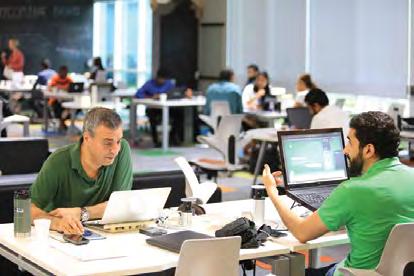

← MOHANNAD ZIKRA is the co-founder and CEO of STELLA STAYS, a Dubaibased proptech company that offers furnished residences and suites, on a subscription-basis, for as short a duration as one night to longer periods of more than a year.

Dubai-based proptech firm Stella Stays is combining the best of hospitality and real estate to reinvent how we find homes for ourselves by AALIA MEHREEN AHMED
In April 2022, the launch of the UAE’s remote working visa scheme -an arrangement that allows for people to live in the UAE while working for employers outside the countryopened the nation’s doors to remote workers from across the globe. The potential influx of such digital nomads -described by Statista as a faction of the global population that “generally combine remote work and travel for various reasons and lengths of time”- thus presents quite a unique challenge to the UAE’s real estate and hospitality markets. “A lot of professionals, especially millennials and Gen Zs, these days are on freelance visas; they’re digital nomads who want to come to Dubai to check it out for a few months,” says Mohannad Zikra, co-founder and CEO of Dubai-based proptech company Stella Stays. “But what options do they have [for their stay]? Hotels are often very costly and inconvenient, but they can’t sign a one year lease for an apartment either. What we thus realized is that this next generation needs flexibility- the ability to pay by credit card, pay monthly, and be in a place that gives them the value, the experiences, and the community that they want.”

} And this is exactly what Zikra’s enterprise, Stella Stays, offers. Launched in 2019, the company offers furnished residences and suites on a subscription-basis for as short a duration as one night to longer periods of more than a year. The vision that Stella Stays aims to achieve is to help people simply “show up and live,” and apart from the UAE, its furnished residences can also be found in Saudi Arabia, Bahrain, Turkey, and Canada. According to Zikra, Stella Stays’ main strength lies in its promise to offer a seamless and quick selection process using the company’s own digital platform- an aspect, he believes, is beneficial to both the property developers as well as the tenants. “What we do is we take a full residential building, and instead of having the real estate developer put it on the market and deal with many different tenants, we convert
it into our own designed, furnished rentals- ones that are enabled with technology and amenities,” Zikra adds.
“We have our own in-house technology team that looks into everything from the way we manage the operations and introduce automations, to giving guests an app that simplifies and digitizes the whole experience.”
} Plus, in a step to further ease the process of moving into an accommodation in the UAE, home-seekers aren’t required to use a local bank’s check or pay a real estate agency fee at any Stella Stays unit, regardless of the duration of a tenant’s stay.

There is also no need to present an Emirates ID -an official ID from any country will suffice- and the hassles of activating one’s accounts with Dubai Electricity and Water Authority and/or telco provider du are also taken care of by the startup. These are just a few of the factors that make the Stella Stays offering stand out, and that the name that Zikra chose for his company only serves to assist in this regard. “What
we wanted to do is build a brand name the same way that customers talk about a Marriott or a Four Seasons,” Zikra explains. “’Stella’ means ‘star’ in Italian, and it held a lot of significance for us because, the way we see it, our customers have so many ‘stars’ to always find and come back to. So, they can say, ‘Oh, today I’m staying at a Stella in Jumeirah Lakes Towers; tomorrow, I’ll stay at the Stella in Marina.’ It’s a very catchy name, and so I think we did a good job!”
It is vital to point out here, of course, that what shaped the fabric of these services by Stella Stays is the very occurence to that led to the migration of digital nomads and the shift to working from home: the COVID-19 pandemic. “When the COVID-19 crisis happened, there was so much demand for flexibility, because, owing to financial instability, not everyone was sure about whether they should renew their rental contracts or not,” Zikra explains. “And so there was a 50% increase in furnished rental bookings at Stella Stays during this period. People didn’t know how long this pandemic was going to last, and so they needed something that’s more flexible.” And it was precisely during that period that the Stella Stays team saw the potential in how their model could be used by a plethora of people, and not just digital nomads and travelers. “Initially, when we started, our focus was really around hospitality and tourism, but when the COVID-19 crisis hit us, we realized our furnished
apartments actually serve diverse use cases,” Zikra explains. “It can work very well for a traveler, but it also works very well for a resident. Because if you really think about it, an apartment is a necessity for pretty much every person in the whole world. It just depends on what persona you apply: is it someone that’s traveling for work that needs a place for three months, or is it a family that’s in between moving houses within a city and needs somewhere to stay?
And so, we really focused a lot of our technologies and strategies in understanding how we actually build a product that works for residents to adopt the ‘show up and live’ concept as well.”
} Here, Zikra states that the model adopted by Stella Stays -from offering a flexible way of living, to easing the process of finding the right home- is an important step towards breaking some of the rigidity that has often characterized the real estate industry. “Globally, technol ogy has come in as an enabler of change- Netflix changed the way people watched content, Amazon changed the shopping experience, Uber changed the transpor tation business; but when it came to accommodations, it is still one of the most traditional businesses that has not changed whatsoever,” Zikra explains. “Whether you want to purchase or rent, the processes within the real estate space are still very traditional; they have not been digitized or innovated. That is the big loophole we’re really addressing, by allowing
people to find the right place at a reasonable price that they could move into, and start living in within a few clicks, without all the headaches that come with it. It was very transparent and very personalized as well- if our tenants have specific requests, they can make that. So, we’re really creating the future of living overall- whether you’re living for a week or two, or a month, or a year, this has become an essential part of what we’re doing.”
} Zikra reveals here that the accommodations provided by his company in Riyadh are witnessing 100% occupancy rates- a statistic that is especially significant given that Stella Stays moved into the Saudi Arabia market not too long ago, in June 2022. “If you also take a look at our global occupancies today, we’re at over 80%, and the reason why we have that is because one of the first things that we’ve done is we’ve built a technology platform,” Zikra adds. “We’ve actually built something called a dynamic pricing engine that makes
sure that not only do we market our products across channels like PropertyFind er, Airbnb, Booking.com, and Expedia, but also in our own system. So along with diversifying our primary offerings to serve many different use cases, we also have the technology that
makes sure that we’re always competitively priced.” But for a company that prides itself on its digital prowess, Zikra believes there is good reason to believe that such results stem from the human element of Stella Stays model. “Part of what we have to do in the vision of Stella Stays is thinking about how we can foster communities and make people feel at home,” he says. “And that’s why we have our own interior design teams. At our recently launched building in Riyadh, we’ve engineered amenities, such as co-work ing spaces, rooftop, lounges, and different types of areas that allow people to get together and communicate. Yes, the process of booking is tech-enabled, and that’s
really what helped us get to 100% occupancy there. But it is three things together -the technology, the building and the stay, and the community that really put together the offering that we’re providing!”

} So, what’s next for Zikra and Stella Stays? “We’re on a mission to grow really quickly globally, but part of our strategy is to really dominate the MENA region for now,” Zikra declares. “As a company, we want to become the biggest landlord globally. And so our focus right now is to build a model that works, that’s proven, that’s multi-city, that’s tech enabled, and make sure that we can build branded residences across all neighborhoods.” Here’s hoping!

STELLA STAYS’ MAIN STRENGTH LIES IN ITS PROMISE TO OFFER A SEAMLESS AND QUICK SELECTION PROCESS USING THE COMPANY’S OWN DIGITAL PLATFORM.↑ MOHANNAD ZIKRA, co-founder and CEO, STELLA STAYS




← Founded in 2020 by Mohammad Ali Abbaspour, SPONIX TECH develops software-based technologies using artificial intelligence, machine learning, and computer vision to drive fan engagement and monetization opportunities for sports rights owners, broadcasters, and brands.

Be it smart stadiums, sports data analytics, or digital signage, the use of advanced technologies in sports has skyrocketed in the recent past with the aim to both improve fans’ viewing experi ences and engagement, as well as to improve athletes’ performance. In fact, according to a 2022 report by Grand View Research, the global sports technology market size is estimated to reach US$55.14 billion by 2030. Seizing the opportunity present in this space is Mohammad Ali Abbaspour, the entrepre neur behind Qatar-based Sponix Tech, which develops software-based technologies using artificial intelligence (AI), machine learning and computer vision to drive fan engagement and monetization opportunities for sports rights owners, broadcasters, and brands.
As a football and technology enthusiast (who was also a professional football player once upon a time), Abbaspour, who had previously developed a sports tech startup in 2013, says that he had always kept a close watch on trends correlating the two sectors.“Watching innovations in producing new content for football made me move forward [with Sponix Tech] ,” says Abbaspour. “Based on my past experience in tech companies and my big passion for football, I decided to introduce something new to the market.” Abbaspour thus launched Sponix Tech with its first solution in 2019, the SPov Immersive Replay, which allows fans to view a match through the eyes of the players on the pitch. Broadcasters are then able to utilize this first-person footage of the match for instant replays, as well as social media marketing to boost fan engagement and boost partnership revenue streams. In the years since it launched, the SPov Immersive Replay has become the company’s most renowned offering, but it was first implement ed during the 2020 UAE Pro League held in Dubai, which Abbaspour points out, was quite a feat. “This was big news in the industry, since, for the first time in a football game, a company was able to provide the point of view of players without having any hardware or camera installation in the stadium.”
Qatar-based Sponix Tech is transforming how people engage with largescale sporting events
As the company gained momentum in the market, Sponix Tech was selected in 2020 to become a part of the Qatar SportsTech, an accelera tor program founded by Qatar Development Bank. This offered a boost to the company’s growth, particu larly towards entering international markets such as Europe, and working with more broadcasters, rightsholders, leagues, and clubs, and Sponix Tech soon became the recipient of several industry awards as well. Looking back, Abbaspour says that a key factor in fueling his company’s growth was its decision to not rely solely on its first tech solution, but to develop another product as it ventured into the European market. This new offering was called the SPboard Virtual Advertisement, which helps

clubs and leagues to increase their revenue by creating personalized virtual ads powered by AI and machine learning. “With this technology, we can produce different signals for different regions, with different sponsors, at the same time,” explains Abbaspour. “It means each billboard could be sold several times for a targeted market instead of one time. We help the clubs, leagues, and TV channels sell more digital sponsorships through our technology.”
With a B2B business model, the startup’s clients include clubs, leagues, sports federations, broadcasters, as well as brand sponsors as it creates a new marketplace to display their messaging. With different clients and partners in the sports industry,
↓ Sponix Tech’s SPov Immersive Replay, which has become its most renowned product, allows fans to view a match through the eyes of the players on the pitch.

Abbaspour notes that his company is currently working with top rights-holders such as the Union of European Football Associations (UEFA), Mediapro, Associations of Tennis Professionals (ATP), and the UAE Pro League. In the broadcasting sector, the startup works with beIN Sports, Sky Sports, RMC Sports and Al Kass, among others. “We are growing fast and expanding to new markets,” Abbaspour says. “These days, we are receiving many new approaches from different sports on different continents.”
Sponix Tech’s offerings are also getting the startup noticed- while it was initially funded by Qatar Development Bank and a couple of angel investors, in August 2022, the startup received an undis closed investment from UK-based Aser Ventures, the co-owner of Leeds United Football Club. With the investment, Aser Ventures has also acquired a strategic stake in the startup, and Abbaspour explains that they plan to use the new funds to improve
WITH THE SUPPORT OF QATAR SPORTS AND TECHNOLOGY ORGANIZATIONS, WE ARE MOVING FORWARD IN THE NATIONAL AND INTERNATIONAL MARKETS.↑ The Sponix Tech team at an industry event.
current technology, develop new products, as well as boost marketing and promotion efforts, and improve the startup’s infrastructure and operations. Meanwhile, the startup has also been selected as one of the three national winners to represent Qatar at the Entrepreneurship World Cup 2022, a global startup pitch competition featuring entrepreneurs from over 200 countries.
Of course, building a sports tech company in Qatar has its ups and downs. According to Abbaspour, with Qatar hosting the 2022 FIFA World Cup, the country has developed better infrastruc ture for startups in the sports sector. “More importantly, the culture of accepting startups and supporting them during their growth has been established in Qatar and MENA region,” he says.
“Startups can feel that they are able to work perfectly on their ideas and grow to the next stage with the infrastructure and support from the Qatar ecosystem.”
Plus, with the country having an influx of renowned sporting events such as the upcoming 2030 Asian Games, the Qatar Grand Prix,
the Qatar TotalEnergies Open, and others, there are a lot of opportunities up for the taking for companies like Sponix Tech. However, Abbaspour points out the local sports industry is not as mature as in the US and Europe. “Our technologies like immersive replays and virtual advertisements are so attractive for European and US clients, but we have some difficulties introducing our technologies to the sports market of Qatar,” says Abbaspour. “But with the support of Qatar sports and technology organizations, we are moving forward in the national and international markets.”
As for Sponix Tech’s future plans, Abbaspour says that his team is currently in touch with top-tier rights-holders like the UEFA and FIFA, adding, “We are planning to grow the number of matches that we cover during a month.” In the next months, the team are working on top competitions like Premier League and the much-await ed 2022 FIFA World Cup, with the startup’s SPov technology set to be used by select broadcasters of the tournament. And it’s not just
football- Abbaspour says that he and his team are gearing up for Sponix Tech’s offerings to to be used in other sports like basketball, handball, padel, and others. In terms of the long term, Abbaspour hopes to start partnerships with other global entities in the industry (“like the NBA”), as well as plans to enable a


collaboration between local sponsors and the 48 participating countries during the 2026 FIFA World Cup. “There is no end in the technology world; we have to adapt ourselves based on the new trend in the sports tech industry,” he says. “Since our technologies are all developed from scratch, our innovative teams at Sponix are thinking of future products based on the development of cloud systems, artificial intelligence, and machine learning knowledge.”
1. Determine your product market fit
“Be sure of the market requirements, since there can be a difference between your ideas and what really matters for the market/clients.
2. It’s a marathon, not a sprint
“Entrepreneurs have to work hard and be focused on their product and strategy. The market does not usually attract to their ideas and products in a couple of weeks or months; it can sometimes take more than a year t to see the first results and get feedback from the market.”
“One of the missing parts that I observed several times among entrepreneurs is that they don’t know what the latest technical and commercial trends in their sector are. But it is so critical to know the latest situation in terms of their clients' needs as well as their competitors' progress and next moves.”
Tips for entrepreneurs from Mohammad Ali Abbaspour, founder and CEO, Sponix


→ Ankit Shah, Head of M&A, Mortgages UAE, Huspy; Jad Antoun, CEO & co-founder, Huspy; Ana Monteiro, GM Mortgages, Huspy; Ramesh Khemani, founder of Just Mortgages; Manish Bhaggnari, CEO & Founder of Finance Lab

When you hear about mergers and acquisitions (M&A), startups are normally the ones being acquirednot the ones acquiring.
After all, acquisitions cost time and money, and they come with inherent risk. An acquisition gone wrong can hit even a strong business hard, especially when there is a mismatch between the culture and values of the two companies. Large corporations are ready to take on these risks, because the potential reward is so tempting: if all goes well, a company adds industry exper tise or innovative tech solutions to their business fast, without the need to hire and train a new team, go through research and development, etc.
Yet, M&A can prove to work for startups as well- if done for the right reasons. M&A can help a startup achieve scale and complement their existing areas of expertise in a short time frame. Data shows that venture capital (VC)-backed startups globally have recently been on a shopping spree acquiring other companies, and 2022 may be a record year for this trend. In the first five months of the year alone, 663 startups have been acquired by other VC-backed companies.
At Huspy, we have completed three acquisitions in 2022 in an industry that is highly competitive and fragmented. In January 2022, Huspy acquired Home Matters to become the leader in the home mortgage segment in the UAE. We followed that up in August with the twin acquisitions of Just Mortgages and Finance Lab. Here are my learnings from our M&A strategy at Huspy, along with some advice for founders on what they should keep in mind if they go down this route too:
1/ The acquisition must fit your business strategy. First, understand if a particular acquisition makes sense for your business. Does it help you gain access to a new customer segment, expand to new markets, or explore different verticals? Having clarity on the objective of the acquisition is a key prerequisite for a successful transaction. Simply being able to afford it is not a good enough reason to follow through with the deal.
2/ Know the financial impact. Founders with strong cash flow or access to funding may find it tempting to acquire businesses for the simple reason of achieving scale. But without understanding the financial implications of acquiring a business, an acquisition may not have the intended impact on your company goals. As a business leader, you must work through how the two businesses can complement each other, to create top-line and/or bottom-line impact.
3/ Commit to being hands-on through the acquisition. An acquisition is much more than just a financial transaction. Founders must be involved through every stage– scouting for a deal, defining the terms, the agreement, and, at the very end, integrating the two businesses. It requires patience and active involvement to see this through. By being hands-on, founders also send the right signal to both teams of their commitment to make this a success.
4/ Ensure the culture and values match. It takes time and effort for a startup to define who they are as a team amidst the hustle and chaos of the early days, and then to stay true to those values. If you are at that stage, appreciate and celebrate the culture you have built, and evaluate if the other company’s culture is a good fit for you. When acquiring a company, you want to ensure that both businesses have a vision, culture, and values that align, or, at the very least, do not conflict with each other. This is especially important if you acquire a traditional business.
5/ Communicate proactively. In a startup focusing on growth, internal communications can often take a backseat. It is important that news about M&A is communicated to both teams timely and appropri ately. By communicating early, you give your team members an opportunity to be engaged in the acquisition journey, and ensure their buy-in and support. It is crucial that employees hear about the acquisition first-hand internally, not while reading morning news.

Bedaya Center for Entrepreneurship and Career Development (Bedaya Center), a joint initiative by two other Dohaheadquartered entities, Qatar Development Bank and social organization Silatech, has part nered with retail store network
LuLu Hypermarket’s Gharafa branch to launch a dedicated section that will enable local entrepre neurs to display their products and services.
Speaking on the vision behind such a move, Hamad Al-Qahtani, General Manager of Bedaya Center, said, “We always seek to enrich and enhance the capabilities of entrepreneurs in order to advance their businesses and put them on the right path to take their first steps in the world of success. Our mandate is to help our promising entrepreneurs achieve their desired goals that would stimulate their business, emphasize the quality of their products, and enhance their pioneering role in society by qualifying them to expand their clients base and achieve a wider reach for their offerings.”
DATA SHOWS THAT VENTURE CAPITAL (VC)-BACKED STARTUPS GLOBALLY HAVE RECENTLY BEEN ON A SHOPPING SPREE ACQUIRING OTHER COMPANIES, AND 2022 MAY BE A RECORD YEAR FOR THIS TREND.↑ On the shelf Initiative
6/ Have an integration plan from day one, but remain flexible.
I believe that it is the people behind the M&A that ultimately determine whether it is a success or failure. Startups must always have a plan on how they are going to integrate the two businesses and create an environment that is welcoming of incoming employees. Craft an action plan with clear steps and a timeline to follow. The onboarding process is key for newcom ers to understand the overarching vision, as well as the technicalities of daily routine: for instance, what tools to use, and how to communicate with other team members. At Huspy, with team members coming in with years of experience in different domains –real estate, mortgages, banking and account management– we struggled initially to adapt the existing processes, and drive the adoption of the company’s customer relationship management (CRM). Each team member brought the working style and tools they had been using for years. Old habits die hard, but it is important to unify work processes if you want to build an efficient business. With a unified CRM, we are now able to create efficiency for the business, and a better employee experience across the organization. To achieve similar results, be prepared to continuously align and manage team’s expectations and make the necessary trade-offs along the way.
7/ Communicate benefits to your existing customers and partners.
For a growth-oriented company, unlocking growth by way of an acquisition can be an obvious decision. However, companies must also evaluate how their current customers and partners will benefit from this. By acquiring a new business, will your customers have access to a range of new products? Alterna tively, will your partners benefit from the increased scale of your operations? Let all of your ecosystem stakeholders understand the value of the acquisition and the opportunities for them.
Building a startup means having a bold vision and ambitious goals, taking risks, but also being able to fail fast, take full responsibility for your actions, and having a back-up plan. As I look back on Huspy’s two-year journey, acquisitions have provided us with significant scale, knowledge, and expertise that would otherwise have taken us time to gain. We launched the business to transform the entire home-buying experience in the region, from finding a house, to financing it, and closing the deal. And with the three acquisitions we have done this year, we are well on our way towards our goal.
Jad Antoun is the co-founder and CEO of Huspy, a UAE-based proptech startup on a mission to improve the home-buying process in the MENA region and beyond. Huspy aims to create a category-defining business by building a single platform where customers can find and finance their home faster and more easily than ever before. The company’s innovative technology is at the heart of the real estate ecosystem, empowering all market players -brokers, agents and banks– to redefine the future of home-buying. huspy.com

This particular announcement follows Bedaya Center’s “On the Shelf” initiative which had been launched in early 2022 -also in collaboration with Lulu Hypermarket- to offer six Qatar-based startups with an in-store space to display their products for a period of three months at no cost. The 33 participants from the six startups went through a three-day program to learn how best to prepare their products for inclusion and display in retail shops and supermarkets.

On his part, Dr. Mohamed Altaf, Director of Lulu Group International, spoke of how the new announcement continued to further his company’s goals too. “We are elated to witness the successful results of the strategic partnership with Bedaya Center, which is in line with our vision of supporting and embracing Qatari startups, small and home businesses by opening new horizons for a large number of entrepreneurs who avail the Center’s support, especially when the Qatari products have proven their worth and ability to compete in terms of high quality and best prices,” he said. “As we witness the launch of a special section dedicated for startups to display the products of the participating projects under the umbrella of Bedaya Center, we are confident that this distinguished initiative will be a constructive step in the joint co-operation with Bedaya aimed at supporting Qatari entrepreneurs and their emerging projects.” bedaya.qa



Although Mohammed Alzubi, founder and Managing Partner of Nama Ventures, a venture capital fund focused on fostering technological innovation across the MENA region, believes that each of more than of his 80 investments has served as a good learning opportunity, some are more surprising than others.“There was a startup that I had a lot of conviction in and truly felt it would be a success, especially since the indica tors of success were present, and it did raise north of US$150 million in its lifetime, but it eventually failed,” Alzubi recalls. “Yet, another standout investment I made was in a company that felt simply like a company that would produce good, although not significant, returns, but it turned out to become among top five global unicorn companies.”
} These anecdotes hint at the breadth of Alzubi’s career as an engineer, entrepreneur, and investor. Having earned a bachelor’s degree in electrical engineering from Brigham Young University and an MBA from London Business School, Alzubi has worked in Sillicon Valley, Dubai, Kuwait, and Saudi Arabia, while also co-founding Tech Wadi in Silicon Valley, and also becoming a founding board member of Riyadh Angel Investors, among many other engagements. His investment philosophy is simple, he explains, as it revolves around betting on great teams, and trying to influence their success from an early stage.
“The first $25,000 angel investor check I wrote back in 2005 was the best money I’ve ever spent, because it taught me what not to do when investing,” he says. “My personal philosophy has changed a lot since then, because I used to be focused on providing value by consulting in my technical domain expertise. As the years have gone on, I realized that a lot of investing and advising is about empathy, and truly making entrepre neurs understand that I know what

they’re going through, since I’ve been there myself. That’s why we’re focused on leading pre-seed funding at Nama Ventures, as our value-add is our experience in the entrepreneurial journey, and less so about technical domain expertise.”
} NAMA Ventures’ approach to startup investing is people-focused, as Alzubi believes that while the problem a startup is working on solving can vary over its lifetime, the right team can tackle these changes correctly and propel the company toward success in the long run. “Take Airbnb, for example, which started out as a platform for people to rent out extra rooms in their apartments,” he explains. “Since its founding, Airbnb has expanded to larger rental markets and experiences. The problem and solution kept changing, and the team was adapting to this. I think that if a startup is still focused on the same problem/solution mix after 18 months of launching, then something is wrong- they likely haven’t gained enough insight to pivot or correct their solution.” To be precise, Alzubi points out that successful companies are built by teams that have the ability “to be humble and accept that their initial assumptions were not correct, including the skills to try out various solutions.” Alzubi gained this insight not just from his work as an investor observing other startup founders, but as an entrepreneur too. When he was the founder of Silicon Valley-based tech solutions provider Sulaf Solutions back in 2002, Alzubi learned
firsthand that initial assumptions made by entrepreneurs are often wrong. “And that’s actually not a bad thing,” he adds. “It’s important to launch your minimum viable product, and then find out how it stands up against what the market truly wants. When we launched Sulaf Solutions, we wanted to address the SME sector by providing ‘IT in a box.’ This was much before cloud services, so a tech startup or SME still needed to build and maintain their own network infrastructures, which is a costly task. By offering these services in a retainer model instead of the usual payroll model, companies could save big.”
With that change in their business model, Alzubi says that the Sulaf Solutions team managed to gain the likes of companies like Sun Micro systems, Embarcadero Systems, and Wilson Sonsini as customers within a year of launching. “We would have never imagined that we’d have giant customers like these, but we had the right team that asked thoughtful questions, and responded thoughtfully with a solution,” Alzubi adds. “We pivoted, reacted, and built a product that people really needed.”
Armed with this kind of entrepreneurial experience, Alzubi then returned to the MENA region to set up Nama Ventures, which he dubbed as “the champions of pre-seed in MENA tech startups.” He explains, “I left
the epicenter of technology in the world to come to the MENA to create a lasting impact in entrepreneurship. It’s safe to say that you can’t find a bigger fan for the region- I’ve bet the next 10 years of my life on the belief that the MENA will produce world class technology companies. This is the golden age of entrepreneurship in the region, and there is no better time to be a founder in MENA.”
}In line with this belief, the Nama Ventures website features dozens of their portfolio startups, but when talking particularly about startups from the MENA region, Alzubi mentions a quote by American actor Steve Martin who explained his success as a comedian by saying that he had followed the “be so good that they can’t ignore you” advice. By the same token, Alzubi believes, MENA startups have managed to gain a repu tation among international venture capital funds. “And that’s why I’m so confident that the tech ecosystem in MENA will drive meaningful impact, both locally and globally.” And Alzubi is even more confident about the future, especially since he expects technology to disrupt every facet of our lives, and give rise to potential startup unicorns in literally every sector- and many of those might just be from the MENA region. “At Nama, we make it a point to be sector agnostic, since there are
opportunities in every industry for technological innovation,” he says. “We’ve made bets in fintech, entertainment tech, education tech, and beyond.” MENA-based entrepreneurs, Alzubi advises, should look at the world’s most successful tech companies and pivot their work in such a way that makes it relevant to this region. “Essentially, you should study a list of unicorn companies, understand what their value is, and figure out if someone is already doing that in MENA,” he con cludes. “If not, that’s a good place to start.”
} One learns only by doing "The best lessons are learned with your own money, because you have to invest to learn. You will get it wrong the first time around, and because losing money hurts, the lessons will resonate."
} Risks are part of the process "We don't have all the answers at the starting line. We gain insight in the journey, so take a leap of faith, and don’t be afraid to take risks."
} Collaboration is key "I had to learn the hard way that entrepreneurship is a team sport. Your job is to enable, not to operate, the companies you invest in. Plus, earn the trust of founders- when earned, it can last a lifetime."
AT NAMA, WE MAKE IT A POINT TO BE SECTOR AGNOSTIC, SINCE THERE ARE OPPORTUNITIES IN EVERY INDUSTRY FOR TECHNOLOGICAL INNOVATION.
Tips For MENA-based investors from Nama Ventures founder Mohammed Alzubi
MONEY MATTERS
“SANDBOX IS NOT ABOUT DTEC; I want to make that really clear! SANDBOX is about founders.” In this statement, Hans Christensen, Senior Director, Technology and Entrepreneurship, at Dubai Technology Entrepreneur Campus (Dtec), fully encapsulates the essence of the entity’s latest startup program, SANDBOX. Open to tech startups with a minimum viable
product (MVP) and are within the seed stage of their enterprises, SANDBOX is a 12-month-long in-person program being held at Dtec, the Dubai Silicon Oasis-run innovation hub that’s the largest of its kind in the MENA region. “When we designed the program, we started primarily with one question: ‘How can we best service and resource early-stage founders in a timely
manner?’” Christensen says. “That’s the very simple basis upon which the whole program is built. The SAND BOX program is sector-agnostic, and the reason we’ve chosen to do so is, because diverse startups attract diverse founders, and a diverse set of founders means a diverse set of knowledge. Inherently, when one founder is doing well, he or she will pull the others up, and everyone improves. That sense of camaraderie is a super important element to the program.”
SANDBOX accepts applications from UAE-based teams who can promise scalable business models and defen sible technology, and it has no cohorts, which simply means that there are no application deadlines; the program accepts applications on a rolling basis. “Startups and founders can apply whenever they’re ready for us, without the pressure of an arbitrary deadline,” Christensen explains. “You can see that

Dtec's new startup program SANDBOX aims to create a new community of innovators in Dubai
we are reflecting how founder-centric SANDBOX is from the application process alone, not to mention the actual program itself. SANDBOX is not an accelerator. Rather, it is a founder-centric program that’s been developed from the ground up by founders, by former founders, by venture capitalists, and by Dtec, which has been at the forefront of the founder ecosystem in Dubai for years.” Noting that the acceptance rate of applicants enrolled into SANDBOX is
just shy of 2%, Christensen adds that “the application process is deliberately tough. We’re looking for quality founders, building quality tech startups. We’re not driven by quota.” Fortunately, rejected applicants can reapply to the program as soon as four months after their prior try. Christensen’s advice to founders applying to SANDBOX is to “be genuine, be concise, and showcase your product no matter how early it is.”
Applicants need not be commercially active, but they ought to show evidence of initial traction and highlight why they are the right people –and why now is the right time- to be building what they’re building.

SANDBOX’s founder-

focused approach is keen on keeping the attention solely on quality and merit. “It’s really a meritocracy, so to speak,” Christensen says. “If the applicant is great enough, then they can come into the program. There’s nothing stopping anyone from applying to the program. We are completely open!” Here, Christensen adds, “We really focus on the business, and that’s where we can truly help.” Once accepted into the program, the founders stand to receive a plethora of offerings. These include over 200 hours of workshops, over 100 hours of one-to-one mentoring from industry practitioners working with startups, weekly legal support, as well as weekly access to accoun
tants. The SANDBOX program also offers in-kind credits valued at more than US$1 million from partners, as well as opportunities to partake in multiple Dubaibased exhibitions such as GITEX and Step Conference. “Currently, there are 19 startups enrolled in the program, which is absolutely fantastic,” Christensen reveals. “They are all early stage -typically pre-seed to seed stage- many of whom are with a proven productmarket-fit already. Several are also revenue generating, which I’m pleased to share. Some of them are already venture capital-backed; others are at least angelbacked. So, there’s a very diverse, eclectic mix of startups so far!”
For a program that runs all year long, however, it is only right that it remains tethered to certain fundamentals that can guarantee consistency in achieving growth. Six such pillars form the basis of SANDBOX: product development, traction, scaling, financial diagnostics, legal support, and, uniquely, wellness. “We’ve added each pillar because they are core elements to building a
THE SANDBOX PROGRAM IS SECTOR-AGNOSTIC, AND THE REASON WE’VE CHOSEN TO DO SO IS, BECAUSE DIVERSE STARTUPS ATTRACT DIVERSE FOUNDERS, AND A DIVERSE SET OF FOUNDERS MEANS A DIVERSE SET OF KNOWLEDGE.
← Once accepted into the program, the founders stand to receive over 200 hours of workshops, and over 100 hours of one-to-one mentoring

successful startup,” Christensen explains. “We are arguably the program in the region that places an equal weighting on building a product, getting it out to market, sales and fundraising, as we do on wellness, founder wellbeing, mental resilience, fostering a winning team culture, and everything that comes with the wellbeing discipline.” Christensen then goes on to explain how SANDBOX has vetted and assigned local and global industry experts who contribute to each program pillar. “These experts and mentors are on hand as and when the founders need them,” he says. “They contribute to each pillar in the
form of workshops and one-to-ones, with their teams often working on or in the startup on behalf of the founders as well.” But, access to expert mentor ship isn’t all that is up for grabs within these pillars. “What is unique about the structure of the SANDBOX program is that founders can pick and choose which pillar to focus on, based upon their priorities or key perfor mance indicators in any given day, week, month, or quarter,” Christensen adds. “That allows us to offer a program that accommodates to the needs of founders, not just the needs of startups, across lots of different disciplines at the same time.”
And with the global business land scape facing what is being called the funding winter, Christensen expects the two most utilized pillars of the program so far -financial diagnostics and legal support- to continue being in high demand. “Once a startup achieves product-market-fit, or is perhaps in its growth stage, it typically looks to raise funds, and so, the founders often leverage the support of those two pillars to put them in the most optimal position to fundraise,” Christensen adds. “It’s also worth mentioning that fundraising is tricky and challenging at an early-stage across the board, across the world, throughout time. While the other pillars are also very well utilized, there’s a lot of demand from the founders on these two pillars because, ultimately, they are not accountants or lawyers; they’re entrepreneurs!” But amid all the technical nitty gritties of building a startup that’s being
WE’VE BEEN HUMBLY SURPRISED BY THE LEVEL OF UPTAKE AND ENGAGEMENT NOT JUST FROM THE FOUNDERS, BUT ALSO FROM THE BROADER DUBAI COMMUNITY, FOR THIS INITIATIVE.
addressed by SANDBOX, one mustn’t overlook its sixth and final pillar: wellness. 72% of the entrepreneurs sampled for a 2021 study by UC Berkeley suffered from mental health issues. Another study by Wamda and Microsoft showed that 55% of startup founders in the MENA region were stressed due to investmentrelated issues, and 35.9% of founders rated the state of their mental health as “bad.”

To address this looming issue, SANDBOX organizes regular team outings for its startups, as well as yoga and meditation sessions.
But there is one other event that Christensen believes has been key in catering to the program’s community-build ing and wellness goals.
“Every Monday morning, we host a breakfast whereby we invite one guest in,” Chris tensen reveals. “The guest is typically a venture capitalist, an angel, or a Series A++/B/C entrepreneur from the region, and we have a roundtable discussion with no agenda, just an open conversation amongst founders to learn from one another. We’ve been humbly surprised by the level of uptake and engagement not just from the founders, but also from the broader Dubai community, for this initia tive.” Here, Christensen adds that the in-person nature of the SANDBOX program contributes to better founder wellbeing. “Within just a few months of launching, it is so great to see these founders supporting one another; sharing their personal successes as well as lessons from failures,” Christensen says. “It reduces the stress level of the individual founder when he/she has
somebody to talk to, who’s going through probably something similar or can pick the other person up during a low phase. That is something that’s really working out well.”
As the SANDBOX team now looks towards working with the 19 startups cur rently enrolled in the program, Christensen reveals that this is only one out of the many endeavors in achieving a much bigger picture. “We obviously want to create the innovation community of Dubai, that’s our ultimate goal as Dtec,” he says. “One bigger goal of Dubai Silicon Oasis would be to attract foreign direct investment into the country.
So, SANDBOX is one program that is up and running, but we are already looking at other programs as well. It’s too early to say what exactly, but we want to be the space where innovation and entrepreneurship is happen ing. And right now, we could not be more satisfied with what we have created with SANDBOX.” sandbox.dtec.ae
AHAD A B2B marketplace for cybersecurity solutions
social network to meet new people and join local events
iSchool An edtech platform that teaches coding, robotics and graphic design programs to children online
Bitocast
to explore, listen to, and create micro podcasts
platform that
autonomous, robotic last-mile delivery
B2B marketplace solution for seamless global trade
DUDI A sports social marketplace enabling sports enthusiasts to connect, book and play
EYouth A platform providing online interactive learning programs for youth in MENA Hifz A startup addressing the issue of unsold food
A subscription-based low-code enterprise resource planning solution for SMEs
An indoor wayfinding solution merging maps, augmented reality and Bluetooth beacons
Konspot A whitelabel video conferencing tool for any business workflow
MENAcashback A cashback loyalty platform for consumers in the MENA region
MENAflow A marketing automation platform to increase your eCommerce revenues by 30%
Oslo Offering on-demand cloud-based pet insurance across MENA
Revent A B2C marketplace specializing in pre-owned electronic devices
SanoCRM A platform that enables healthcare providers to attract, acquire and retain more patients
SawaUp A learning experience platform to build a future-ready workforce
Sketshare A collaborative digital whiteboard with video call functionality
TAMARA, A KSA-BASED BUY-NOWPAY-LATER (BNPL) FINTECH STARTUP, has raised US$100 million in a Series B equity round led by Sanabil Investments, a wholly owned company by the Kingdom’s Public Investment Fund. The round also included participation from New York-headquartered investment company Cotaue, Abu Dhabi-based venture capital firm Shorooq Partners, seed-stage funding firm Endeavor Catalyst, and a follow-on investment London-based payments solutions provider Checkout.com.
Founded in 2020 by Abdulmajeed Alsukhan, Turki Bin Zarah, and Abdulmohsen Albabtain, the startup
has seen a steady pace of growth- from garnering more than three million customers, 10x year-on-year revenue growth, and over 4,000 partner merchants that include global and regional brands like IKEA, SHEIN, Adidas, Namshi, and other enterprises. It was also the first BNPL entity to be a part of the Saudi Central Bank’s (SAMA) Sandbox program. In addition, in January last year, only five months
after its launch, the startup was able to close a round of $6 million, which has been regarded as the largest seed round raised in Saudi Arabia. This was followed by another capital investment of $110 million led by Checkout.com in April 2021.
The new capital infusion will be used to bolster the startup’s product offering, while also entering adjacent markets,

→ TAMARA CO-FOUNDERS
Turki Bin Zarah, Abdulmajeed Alsukhan, and Abdulmohsen Albabtain
says Alsukhan, co-founder and CEO of Tamara. “It’s a very exciting time for Tamara,” he says. “In the coming months we will be launching some major brands, and rolling out new products that enhance the shopping and payments experience.” Demand for the BNPL model, which enables customers to order a product and delay payments, has gained traction in recent years. For Tamara’s customer base, Alsukhan notes that it’s appealing to consumers and merchants alike. “On the customers side, we see a clear need for more financial inclusion,” he explains. “Credit card penetration is relatively very low, and existing financial offerings lack transparency and fairness. Our seamless and completely digital journey is a game changer.”
At the same time, Alsukhan states that the startup offers tangible top and bottom-line benefits to its network of merchants, resulting in an increase of conversion rates and reduction of returns. The startup’s solutions have also been able to reduce cash-on-delivery payment methods for merchants, one of the major hurdles for e-commerce platforms in the MENA region. Meanwhile, looking at the startup’s end-user demographic, Alsukhan notes that though they see customers from all age groups, with millennials and Gen Z remaining the highest concentration. There’s also a higher share of women compared to men, although it varies depending on the category. “We find that the biggest motivation [for users] is flexibility,” says Alsukhan. “Another factor that drives adoption is trust- customers can approach Tamara across multiple channels, and we are fair and transparent.”

With new entities entering the BNPL market, it’s interesting to see the team’s approach to ensuring its solutions remain distinct. As a B2B and B2C business, Alsukhan notes that they focus on innovation by addressing pain points across both its customer groups: its merchant partners and end customers. “Our success is driven by a constant drive to speak with our customers, bench mark ourselves to the best globally and set very high standards for quality,” he says. “Tamara has top quality international talent, and we challenge ourselves to raise the bar every day. This philosophy permeates across the company, and it is the main reason why we have achieved so much in such little time.”
While the global entrepreneurial landscape is seeing challenges amid current volatile periods, Alsukhan reminds fellow entrepre neurs to remain steadfast in order to survive and thrive. “Market cycles will come and go, this is not the first and definitely not the last,” he says. “We focus on being a trusted, reliable, and sustainable partner to our partner merchants. Tamara does not chase growth at all costs, and we prioritized core economics early. Serious investors will reward businesses that create sustained value, it has always been the case.”
WE FIND THAT THE BIGGEST MOTIVATION [FOR USERS] IS FLEXIBILITY.
thecloud.ae
THE CLOUD, AN ABU DHABI-BASED BUSINESS-TO-BUSINESS-TO-CUSTOM ER (B2B2C) CLOUD KITCHEN PLAT FORM, has raised US$10 million in a Series A funding round led by Middle East Venture Partners (MEVP), a venture capital firm that caters to early and growth-stage tech compa nies, and Olayan Financing Company, the Middle East investment arm of Europe-based multinational enter prise The Olayan Group. The round also saw the participation of Saudi Arabia-based venture capital firm Rua Growth Fund, among a consor tium of other venture investors.
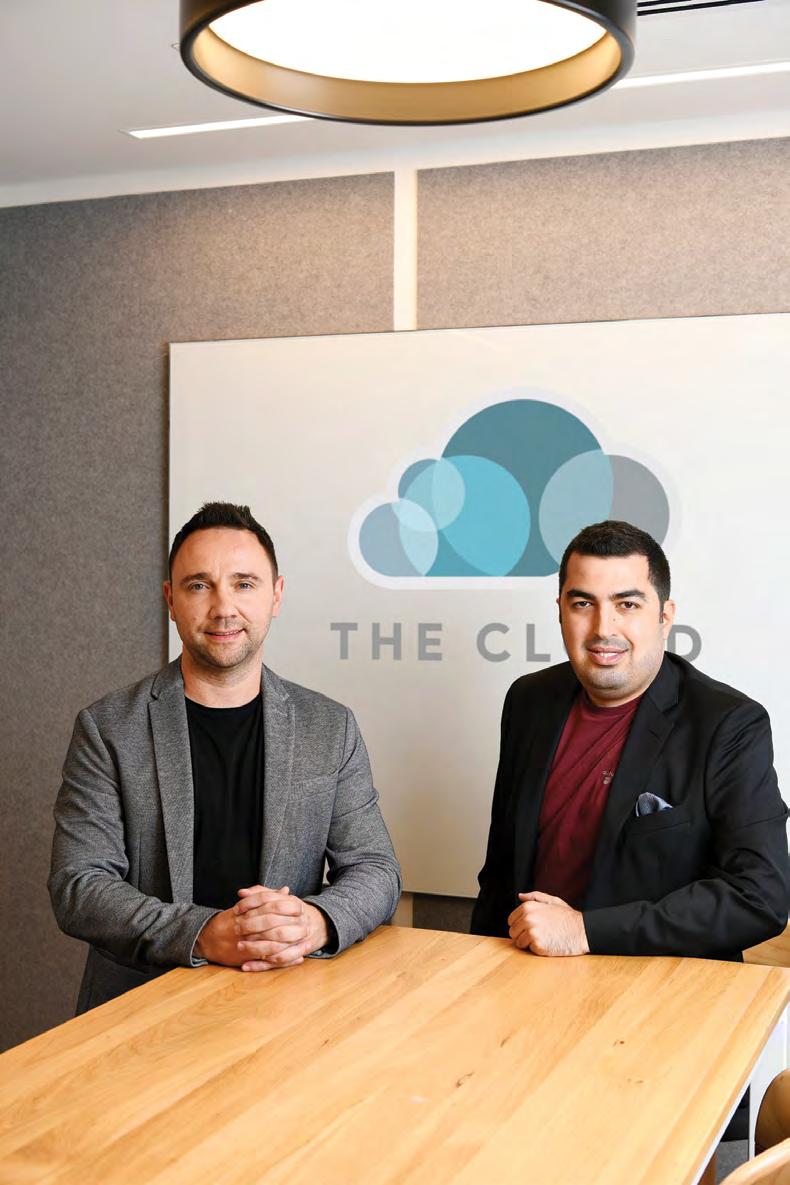
} Launched in 2019 by Kamil Rogalin ski and George Karam, The Cloud was designed with a vision to become “the Airbnb of kitchens” by enabling the transformation of regular restaurant kitchens into artificial intelligence-powered cloud kitchens, and thus increasing their kitchen utilization capacities. In just a little over two years of operation, the startup has already set up shop in the UAE as well as Saudi Arabia and parts of Europe. “The rise of virtual restaurant brands is possibly the biggest disruption of the food service industry in the past 50 years,” Karam, CEO, The Cloud, said. “Virtual brands can be created and launched quickly, and The Cloud’s intelligent kitchen matching technology allows brands to be launched in localities and kitchens, where they are most likely to succeed. For F&B entrepreneurs, this means that they can test concepts and ideas very, very quickly using a fast fail mentality, and without having to take the full risk of setting up a physical restaurant. Proof of concept can be obtained in weeks, rather than
months. The same, of course, goes for expansions into new markets.”
Now, with the new influx of capital expected to be allocated towards further developing The Cloud’s kitchen platform, the startup is keen on continuing its own expansion plans into the GCC and Europe. First on the cards, however, is solidifying
its position in Saudi Arabia, where The Cloud launched in August 2022.
“Our extremely fast growth since launching in Saudi -we are already in 15 cities in the country- shows that it’s a hungry market,” Karam said. “The country has a very big young audi ence, keen to try out new F&B concepts and cuisines and eager for
new tastes. The Cloud can thus cater to these tastes very fast and we are creating new brands every month and also bringing favorite brands from around the world to Saudi Arabia. The Cloud also allows us to increase customer variety and serve customers in the provinces and more remote areas, where there is less choice of traditional brick and mortar restau rants.”
} Karam and his team’s aspirations align well with the projected success rate of the cloud kitchen market, as a whole. As per Allied Market Research, the sector is expected to globally reach $112.7 billion by 2030, with a 2022 report by Zawya showing how MENA-based cloud kitchens are already contributing to a sizable chunk of that growth trajectory. But while the pandemic accelerated the interests of investors and consumers, alike, in cloud kitchens, there also remains the return to normalcy within the F&B sector: in-person dining and brick and mortar restau rants are back. That, however, hasn’t deterred the team at The Cloud. “We’re happy that people are dining out again; F&B needs a good mix of sales channels, but we also realized that the COVID-19 crisis has changed the landscape permanently and has opened many restaurateurs’ eyes to the potential of delivery,” Karam said. “Consumers now value having a choice whether to dine out or in, or to organize a quick get-together with friends and good food. Restaurateurs, on the other hand, realized that they can evolve their restaurants into multi-brand restaurants, growing profitability and optimizing resourc es.”
} Karam and his team’s overall vision has deeply resonated with the leading investors who partook in the Series A round. “The Cloud is truly collabora tive in its approach and operates adroitly at the delicate intersection of restaurant owners, aggregators and food connoisseurs,” Ankit Sarwahi, Managing Director at MEVP, said.
“This unique positioning is central to our investment in The Cloud.” A spokesperson for the Olayan Financ ing Company mirrored similar investor sentiments, saying, “We recognize that The Cloud -which is now firmly established in the UAE’s food technology, online food ordering and delivery industries- is at the heart of today’s increasingly complex restaurant ecosystem. It is accelerat ing growth by unleashing entrepre neurial opportunities and enabling chefs and restaurant owners to focus on what they do best– making great food and building incredible brands.”
} The Cloud’s goals, of course, will be catapulted into action through its new round of funds. So, for F&B entrepre neurs who may need pointers on

fundraising, Karam shared advice that is largely centered on resilience. “Persevere and be determined, and expect many no’s before getting a single yes,” he said. “The entrepre neurial journey is a long one; so prepare the right story, make sure you articulate your vision well so that it resonates, and network, network, network! Surround yourself with like-minded people who will only motivate you to succeed. And above all, believe in your product, work to make it better every day, and have a fail fast mentality.”

CONSUMERS NOW VALUE HAVING A CHOICE WHETHER TO DINE OUT OR IN, OR TO ORGANIZE A QUICK GETTOGETHER WITH FRIENDS AND GOOD FOOD.→ WITH THE NEW INFLUX OF CAPITAL expected to be allocated towards further developing The Cloud’s kitchen platform, the startup is keen on continuing its own expansion plans into the GCC and Europe.
→ AREIJE AL SHAKAR is a senior leader in Bahrain’s financial industry, bringing 17 years of experience in the startup and banking sectors to Al Waha Fund of Funds via her role as Senior Vice President at Bahrain Development Bank.

Bahrain Development Bank’s Al Waha Fund of Funds and international investment firm Hambro Perks (HP) have announced the launch of HP Spring Studios, billed as the MENA region’s first fintech venture studio.
Based out of Manama, Bahrain, HP Spring Studios will both co-found and invest directly into next generation fintech startups. It will focus on attracting highly skilled international talent while also training local talent through upskilling, internships, and educational initiatives in partnership with local institutions.
Areije Al Shakar, Director and Fund Manager at Al Waha, expects that both local and international entrepreneurs will benefit from a fintech friendly regulatory environment in Bahrain and its close relationships with the Central Bank of Bahrain and Bahrain Economic Development Board.
“There are many problems to solve within fintech in the region, and my first tip would be to take advantage of the forward-thinking regulatory framework in Bahrain and the
other regulators across the region,” Al Shakar says. “There is strong investor sentiment and belief in the growth of this regional market, so take the leap forward and start your business. There has never been a better time to be in fintech, especially after COVID-19 accelerated the uptake and acceptance of fintech solutions. The support is there, entrepreneurs need to take the leap.”
Startups will work closely with Al Waha and Hambro Perks’ local and global network of private and public institutions, including National Bank of Bahrain, Mumtalakat, and Batelco, to drive customer traction, and secure future funding rounds to exit.
Al Shakar added that while Al Waha Fund of Funds was founded to help startups overcome challenges around access to funding, HP Spring Studios is expected significantly enhance the region’s fintech ecosystem, “not only empowering startups, but also helping to materially improve the way people save, send, lend, manage, and invest their money.”
springstudios.io

